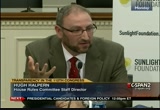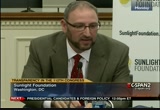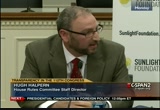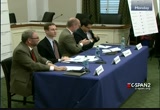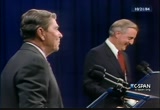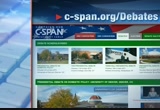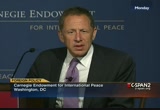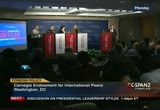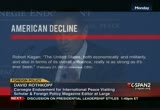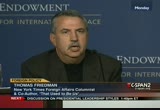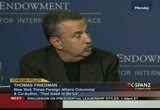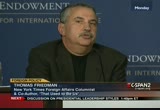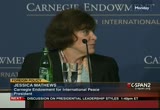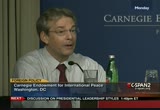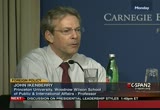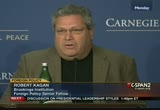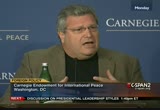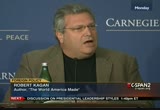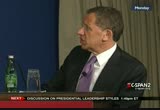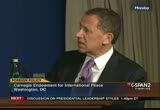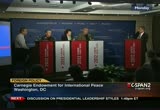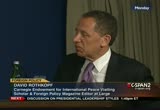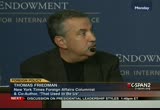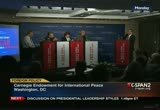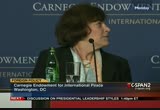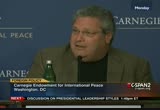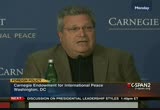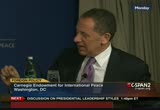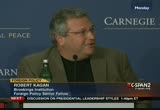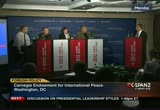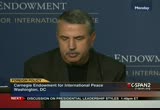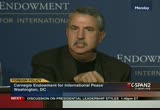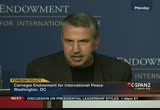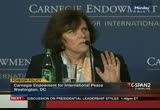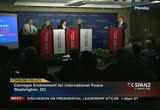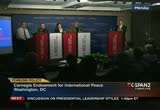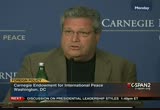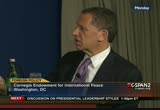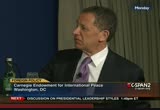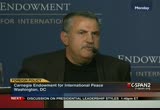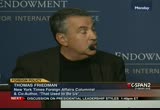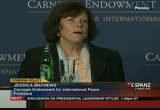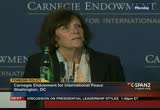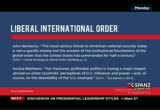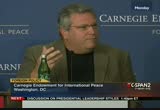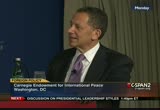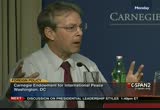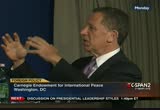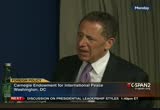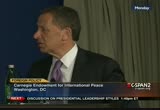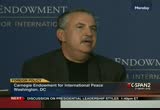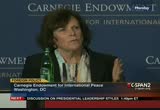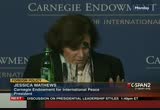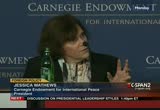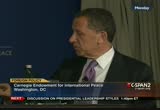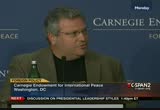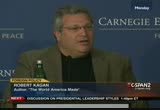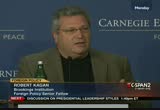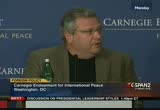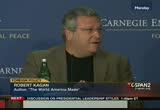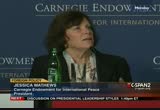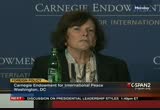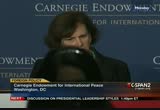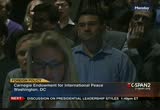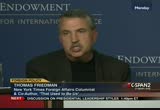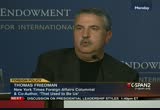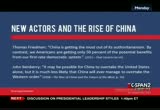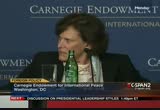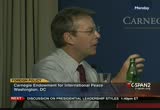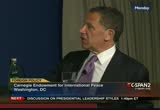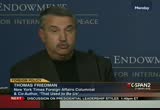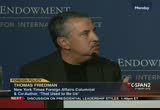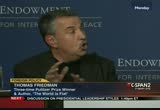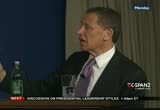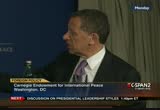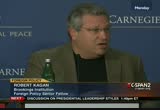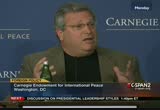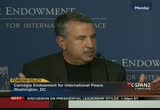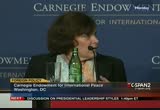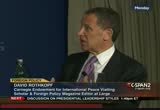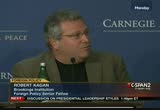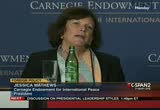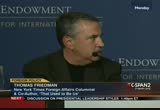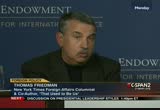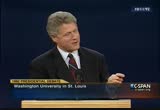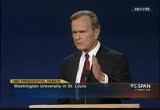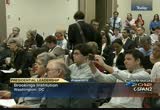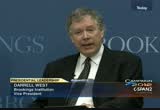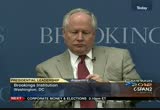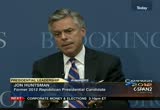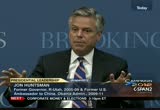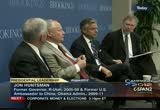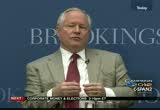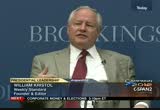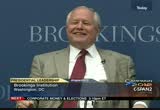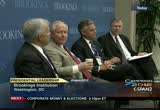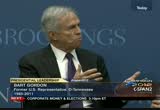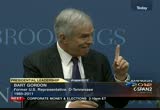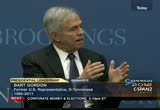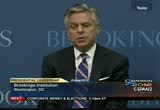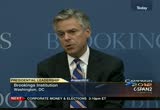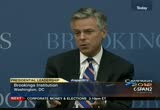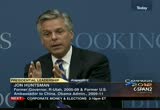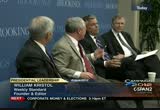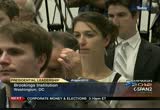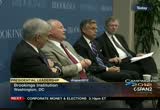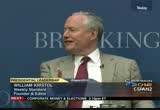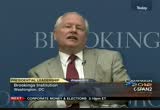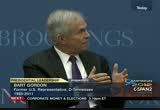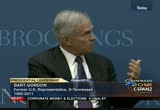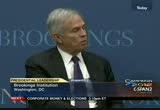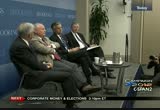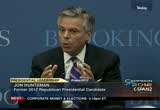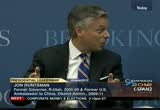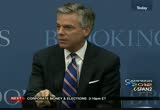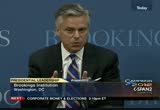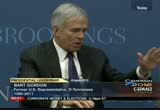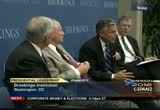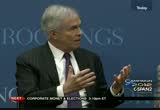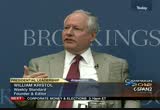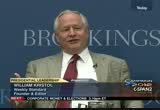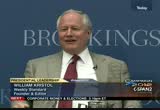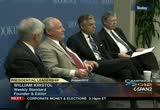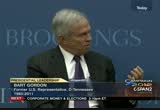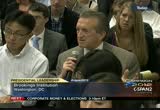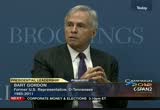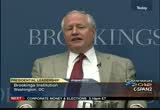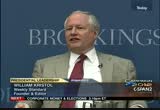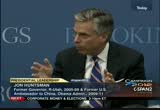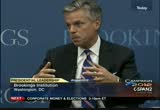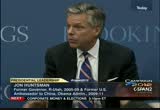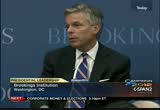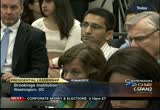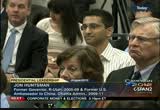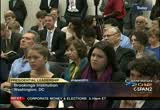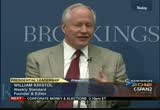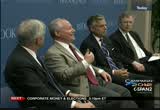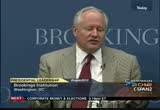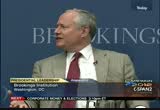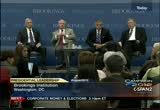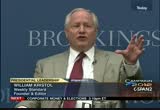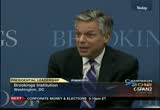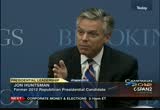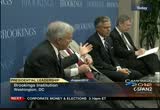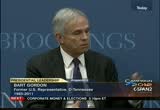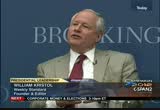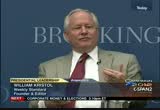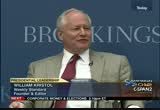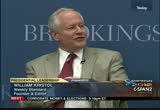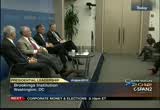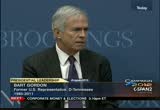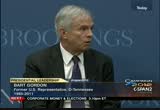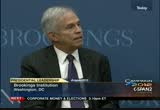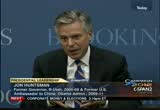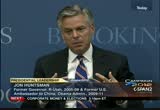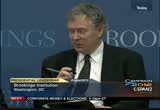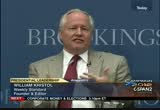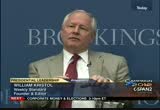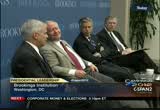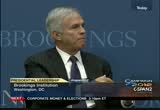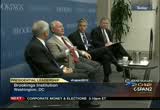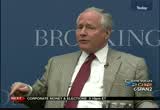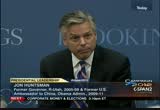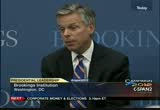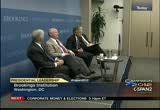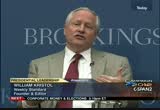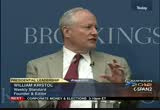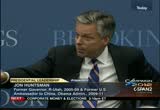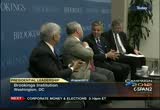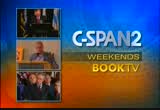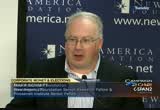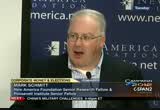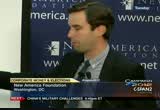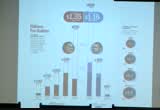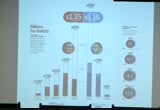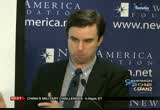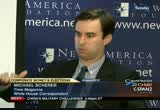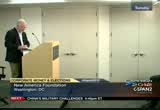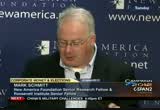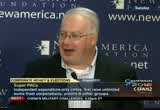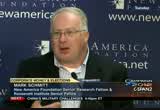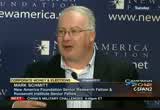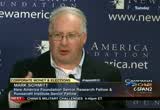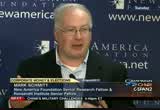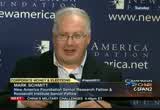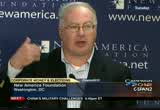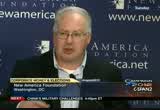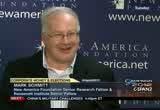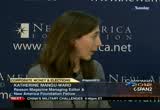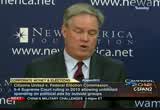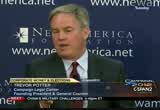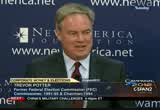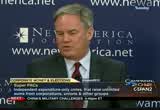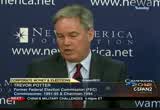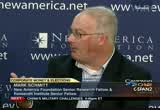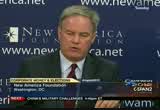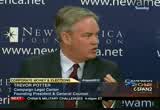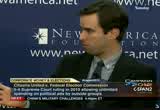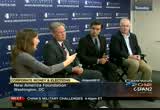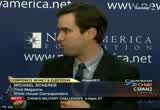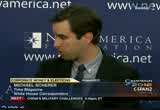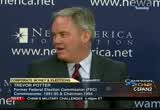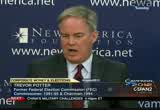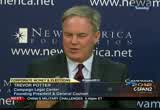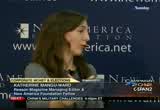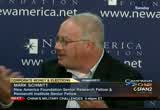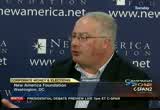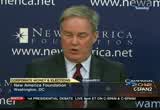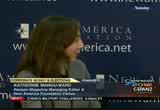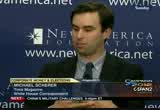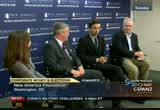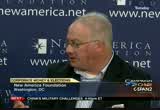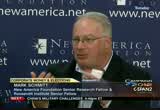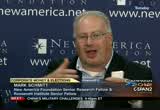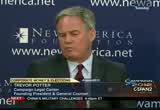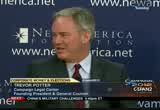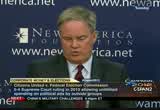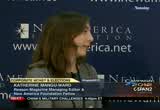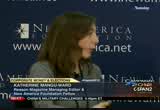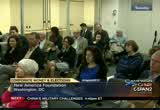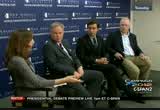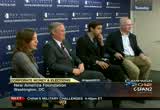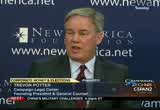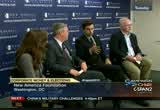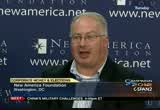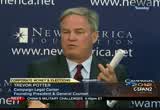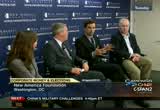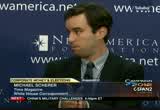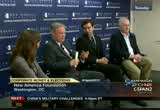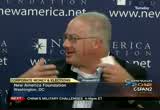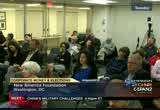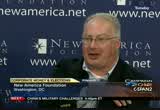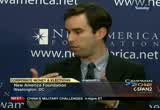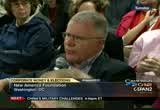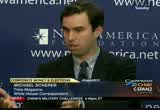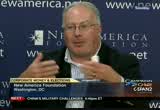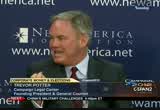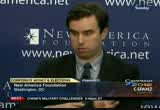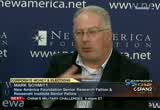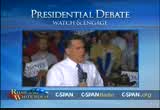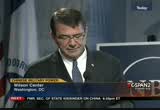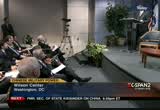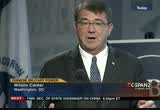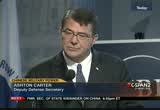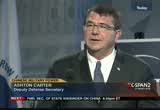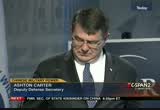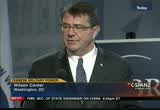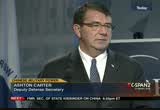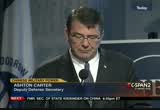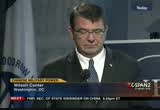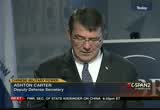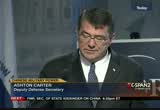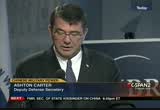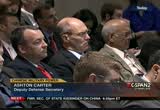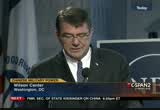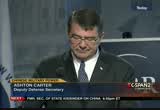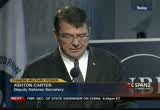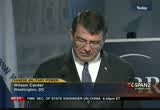tv U.S. Senate CSPAN October 3, 2012 12:00pm-5:00pm EDT
12:00 pm
one of the things i know it doesn't necessarily become obvious to you all because you are the consumers of the end product, but probably where we need to make the greatest number of strides are the internal tools to produce this stuff and there are some great folks working on these now. like i said, i've been working in committees for more than two decades coming and we've got a lot of very, very bright folks but a folks without a lot of technical knowledge. now getting folks to use the tab key instead of five spaces sometimes is very hard. you can just imagine saying you
12:01 pm
can hyperlink to this or we need to put this piece of meta data in here. all of these things we need to dumb down that process a little bit for ourselves internally so that folks who are really primarily focused on policy can also produce documents in a format that can generate the kind of output that everybody around this room is probably looking for. and, you know, like we said we are making great strides on that front, but there's always more and farther to go. and i think that when our tools sort of reach the stage where we can produce the kind of things that you all are looking for quickly and easily i think you'll see the sort of
12:02 pm
exponential affect of that as we go forward. >> i think that's right, and i think you know, for those of us who are not in the government, it's incumbent on us to continue to encourage cooperation inside and outside. all of us have thoughts and suggestions to offer and some have technological expertise to land or policy expertise as well but it doesn't have to be done internally and it's terrifying when the government says we are here to help you. we are from the transparency community. we are here to help house well. with that i would like to thank all of the panelists. i would like to thank representative fisa and -- issa and quigly. please visit transparentycaucess for the next event and thank you
12:03 pm
all so much. [applause] i want to raise an issue that has been for two or three weeks specifically on the national security terms. you already are the oldest president in history and some of your staff say you were tired after your most recent encounter with mr. mondale. i recall president kennedy had to go days on end with bear minimum sleep during the cuban missile crisis. is there any doubt in your mind you would be able to function in such circumstances? >> not at all. i want you to know also that i will not make age an issue of this campaign. i am not going to exploit for political purposes by opponent's youth and inexperience. [laughter]
12:04 pm
12:05 pm
this month as the presidential candidates need for debate we are asking middle and high school students to send a message to the president as part of this year's c-span video tuck gentry competition. students will answer the questions what is the most important issue the president should consider in 2013 for a chance to win the grand prize of $5,000 there's $50,000 in total
12:06 pm
prize is available. c-span's studentcam competition is open to students grade six through 12. for complete details and rules go online to studentcam.org. the final presidential d date will focus on foreign policy. earlier this week the carnegie endowment for peace posted a discussion on the president's role in leading foreign policy. they talked about challenges facing the u.s. including american influence and engagement globally, the changing international order and emerging nations. two of the featured panelists included thomas friedman, "new york times" foreign affairs columnist and author of "the world is flat." and jessica mathews, carnegie president and director of national security office of global issues. >> good evening. my name is david rothkopf, and i will be the moderator for this evening. in the carnegie endowment discussion about how should the next american president engage
12:07 pm
the world. this is a debate format discussion. we have a terrific group of panelists here. starting on the far right we have professor john ikenberry of princeton. next is tom friedman of the new york times. next to him is our own jessica matthews of the carnegie endowment, and beside jessica is bob kagan at the brookings institution and we are going to cover several sets of issues in metal blocks tonight. in each case i'm going to open up. i'm going to open the discussion with a quote from one or two of the panelists. we will then have some interaction. among the panelists and then i will ask them a couple of questions about related issues. following that at end of each one of these 320 or 25 minute sections i am going to look to you for questions so we can keep this as interactive as possible
12:08 pm
and have you as engaged in the discussion as possible. at the very end there will even be a little more time so that if we haven't covered something in the context of these three themes, then you will be able to introduce them into the discussion and we will wrap up promptly at 8:00 tonight. when we do get to the questions and answers a would be good if you would identify yourself and keep your statement in the form of a question rather than a narration. i've already spoken to them about the same goal which is to have a lot of kind of brief comments in the engagement on each of the issues. we are going to start as the first issue on the theme of american decline. bob famously wrote, and those of you in the first three rows can read this. i think those of you in the back it will appear something like an
12:09 pm
odd test but i will read it for you. bob wrote or said in an interview the united states both economically and militarily and also in terms of its overall influence, really is as strong as it's ever been. he said this on february 21st, 2012 in case you want to pinpoint at least that statement. tom, do you agree with the assertion that right now or in 2012 the united states is as strong as it's ever been? >> that depends, david come if you were speaking about strong, relative in to houma? and in what area. i think there is no question in terms of influence. and on the global stage where the country that is most emulated in the world. but it is possible as mohammed
12:10 pm
said the world's cleanest dirty shirt also. and so come on a really prefer to think about american strength and i have to answer this question in a little bit of detail in terms of what are the things that have made us strong to start with? and i would argue that we had a formula for success in this country and was built on five pillars. one was educate our people love to and beyond what the technology was so we could get the most out of it. so it was universal primary education, the factory of the universal secondary education and it was universal post secondary education to the extent that we could do that. we have the world's best infrastructure, bandwidth etc. then we had the world's most open and the sentry half century to increase the most energetic and talented around the world to start 40% of the new countries in silicon valley and the best
12:11 pm
rules for the capitol formation to prevent the recklessness and incentivize risk-taking. and last we had the most government funded research to push the boundaries of science and technology so our best innovators and the entrepreneurs could pluck them and start these companies. if you think about that is a formula for success, and education we now -- well, roughly 30% of high school students drop out of high school. we used to lead the world in college graduates coming out of high school. we no longer do that. on infrastructure, according to the american society of civil engineers we are now $2 trillion in deficit in terms of infrastructure. immigration we have a policy to get a great education and then get the hell out of our country. we are fighting on the simplest h-1b issues that are so vital for our future strength. fourth, the rules for incentivizing risk-taking and preventing recklessness. i don't think that we have in any way remedied that the way we
12:12 pm
want and on the government funded research if it looks like an ekg heading for a heart attack. i don't know if they are relative to what. all i know is in the things that have historically made us great, on each one of those i see us not going in the direction we should be going. and for me that is the alarm bell and we could call and peptalk but i have been trying to put forth. >> jessica, let me ask the same question of you. are we as strong as we've ever been or are there other ways you see measurable decline? >> to me it's obvious that we are not as strong as we've ever been but for the reasons that tom has just enumerated, but also because the world has changed around us. in part because the laws our policy. we spent an awful lot of time, effort and money after world war ii creating an international system, economic system in particular to stimulate the
12:13 pm
growth in the rest of the world. so, this is the success of the policy of several decades that has made us relatively less strong in terms of disposable cash and disposable incentives to get to the behavior that we want to see. militarily, we surely are as strong as we have ever been, but we live in a world that has a number of nuclear powers and we still live in the world before 1957 that had not. so, other than us. you know, to me it hardly even seems worth debating this is a different world. >> i was told we have to debate. [inaudible] the decline is the wrong word. i think the world is getting more crowded.
12:14 pm
they are growing faster and in economic terms the u.s. will have the west shared wealth for the years ahead but there isn't a country by the way that is as jessica said that is a story of american success. it's for 60 years of promoted and open world system rules, a vision of integration and trade, so the architects of the 1940's would be flabbergasted at how successful this order has been. so if that is the decline, it is built into the american vision. but there i think there is a story of transition, of power transmission and the united states is not going to be able to wield the unipolar authority as it has in the past if it ever really could. and so, new habits, new institutions, new bargains with
12:15 pm
countries that are primarily coming up outside of the west and who are not present at the creation so there is a lot of diplomacy ahead but it is a story of taking advantage of the great opportunities that were generated by the u.s. system. >> we have not so much, no way it's not that simple and you had the opportunity to argue if any of them or yourself. >> feel the same way six months later. there's two problems with of the discussion and one is the tendency to overestimate the power in the past and have a very rosy view about how wonderful everything used to be. tom has picked out several areas where you could say that we are measurably worse off and i could pick a bunch of very as we are better off. tom writes in this great book this used to be less segregation also used to be us.
12:16 pm
denying massive amounts of people their rights used to be us, not being concerned used to be us. so i would say looking historically there have been periods where we have been on various different measures better than we are now. they're also been measures where we have been worse than we are now so it is a mixed picture i would say but the question we are addressing i wouldn't say the real question with all the things tom talks about are important and i agree with the pep talk. we don't exercise the unipolar authority if we ever actually did and we never actually did. we spend the cold war dealing with a soviet union that wielded a certain amount of influence and have troops for control of half of europe and i think the situation is unquestionably better now in terms of the
12:17 pm
strategic situation and yielding the overall influence and i think the way to look at this, as john also talked about is when i measure american success and american influence, i measure it against the capacity to uphold a certain kind of world order which the united states has upheld for many decades since the of the second world war. and a lot of the changes that people focus on and tell you don't affect that world order and this is the point that jessica made. the right of brazil and india, just like the rise of germany and japan don't tell against the world order or the united states and its ability to influence things to read our goal is to create a world order where we don't have to have necessarily as much effort in terms of getting other people to do things. but the problem we face right now is there are those challenges. even as i look at those countries, china and russia don't share our goals for the
12:18 pm
world order still have a hard time wishing i lived back in the old days in the soviet union. so i think that the balance in terms of our ability to keep shooting the order -- and winter and on this little point, but one thing is to overestimate how wonderful things are in the past and to overestimate how terrible things are now. we are in the death of a long recession that's time to be depressed. i and a stand that. presumably we will get out of that depression. i think we underestimate our capabilities and underachieve in the international system. i think we have a lot more influence than we have been exercising. >> let's talk about that issue, that issue of influence. the united states has just come out of a couple wars in the middle east where we spent two or $3 trillion. there doesn't seem to be a lot of political will to the engage, so that is on the influence. we are broke as a country, but the limit on the influence and ability to spend we are going to have to start spending less one way or another so that is a limiter. some of the international institutions that we have worked
12:19 pm
with before are facing other challenges. our european allies are certainly inward looking because they've got certain problems. the japanese have certain problems and so forth, so that limits them. nato went outside its boundaries and started broadening its mandate by going into afghanistan. even today in the paper's story say they are leaving sooner. they are not happy with it and so forth. in terms of our ability to project the force, it seems like there are some strong head winds of the very least. john, how do you think that is likely to manifest itself over the course of the next year? we are talking about the american president. how you think he combats this or is he going to be capable combating this perception of the declining american influence? >> i think one thing that has to happen is that the next president needs to be articulate a rationale for the united states to provide leadership even under the conditions where there are economic and other head winds in front of the
12:20 pm
united states. the united states still is a critical player and will have to be a vision of internationalism that is on the sly and on the cheek that is to say new ways the united states can make a difference without necessarily putting marshall plans to work in every region of the world. and then i think the other way to handle the headwind is to come back to one of the virtues and one of the success or strengths of the american approach to the cool border and that is that it does have a capacity for various reasons to partner and build institutions and work with other states. the contrast with china is remarkable. the u.s. has 55 or more security partners of the various sorts from a to z in terms of the nature of the commitment. china has one or two. the united states has somehow found a kind of natural way to operate through international
12:21 pm
institutions, through partnerships, planned states, all sorts of different mechanisms that can generate cooperation. so in this next phase of american history, it seems like that is an asset that we should seize upon. and some people call it a burden sharing and some people call at redistributing the authority for global governance but it's all there. and it's a part of leadership. and in the more demanding times it seems like that is the strength the united states can roll on. >> let's look at this in a constructive way rather than wringing our hands about the decline are debating whether the decline is taking place. again, the next president takes office in january and faces all the problems, enumerated at home plus the fiscal cliff and the tax armageddon and the dysfunctional congress and all of this kind of thing. are there concrete steps the president can take as the principal foreign policy actor to reverse perceptions or to counter perceptions that the
12:22 pm
united states is in decline in terms of its global influence. >> the most important one by far is attempting to heal the rift domestically in answer to your first question we should have said what i think is the biggest change more than the five areas that tom talked about that weakens us which is that we have never been i.t. as politically polarized and divided. we have never had a dysfunctional congress or dysfunctional relationship between the two ends of pennsylvania avenue. so, the biggest thing the president can do, and he doesn't have to negotiate with any of the foreign partners to do it is to get a slide down the fiscal cliff that has a lot of lease soft landing at the bottom, and
12:23 pm
to attempt to go beyond that i think -- i hesitate to say this because it seems unlikely, but in trying to find some common ground on a range of domestic issues because that is the thing that will have the greatest influence abroad that the u.s. still has what it used to have which doesn't look like it does now. >> just a heads up to you because we are moving along at the cliff and i have two more questions from them. i'm going to turn to you and get one or two questions or maybe three quickly from the audience before we go back into the next thing and will be on the theme of the american declining and american influence. so if you've got a question that is half-baked in your mind then you have another dozen minutes to make its. tom, i think jessicas assessment makes a lot of sense but it seemed confused with hope to it
12:24 pm
in the situation we are likely to face in this country, based on what you believe is possible in terms of 2013, what can the president do if anything? >> a couple points. one is i start from the position of being an american nationalist. america plays and on balance and constructive role in the world, and that if we are weekend at home your kids won't just grow up in a different america the will grow but fundamentally different world of the fund of goods the united states provides, we are not perfect, we are so far from perfect but we have brought enormous amounts of a global public goods so your kids will not grow up in a different america they will grow up in a different world so that is what you focused on what are the sources of the strengths and how we reena them. as jessica said you can't renew those sources of strength
12:25 pm
without some sort of a political compromise. i would argue that we are actually two big decisions away from immelt up in the american economy. if we did get a decision on the grand bargain that the ten year time frame of how we would manage the cuts and spending and tax increases and investments, because we need to do all three. we need the tax, we need to cut and invest in the sources of our strength. i think that would just have a huge -- americans feel like children are permanently divorcing parents, and i think it is like a poll on the country in a lot of ways. so second, if we had a grand bargain on energy, how to exploit the bounty of natural gas in particular in the environmentally safe and sustainable way on the national basis i think those two things together would have a huge impact. so the question is how close are we to that? and i was saying about the middle east but it may apply to american politics is all
12:26 pm
important politics happens the morning after the morning after. so, i think -- hearing talking about the election. i don't know how the election is going to come up and make no predictions but i do ask myself if romney gets smashed i don't think the political problem is we have a center left problem and we have a far right party that is a structural problem. the republican party has gone nuts in my view. they've been at war -- there's been a simultaneous -- they've been simultaneously at war with physics at the same time. on the deficit and biological l2 mac, some of them for sure.
12:27 pm
so the question to me is what happens the morning after this election if romney loses. he wasn't far right enough. i wonder if the morning after the morning after. people would say we have gone too far to the right and we need a different republican party which i think the country desperately needs because it needs to be center-left and it's the only way we agree to get big compromises on these issues. >> can i add the role of history suggests the clinton and ronald reagan the second term as the productive term, the big achievement so it's hard to know whether the republican party will -- where they will push the blame if that happens, but the question is how they decide to spend the next four years and i think it's very hard to tell but there is some hope in looking back at both clinton and reagan.
12:28 pm
>> he was also a far right to limit took running the republican party at the time whoever they equivalent was a time and. but in fact he wasn't. life was a little more complicated by the fearful analogy. >> he raised taxes -- >> i think that's why the parties in opposition tend to be less responsible than parties of power. i think you probably agree. >> agree from your point of view i can think of the times when the other party the of irresponsibly in opposition and the question as it seems to me it from the is elected and you have the party that you think would be responsible and is in the position they have to govern and we will see what happens if that genuinely tends to pull the party is more towards the sector whenever someone becomes president just because the left is unhappy with obama in many
12:29 pm
respects because he would see what happens on the space opposition. if obama wins the second term that is going to be the interesting question my optimistic view of history is different from jessica. we have been missed partisan and defied and gridlocked many times throughout our history. many times people were buried and said democrat and republican on the tombstone. the newspapers or democratic present republican newspapers. i know you remember the tariffs dispute very well, but there was tremendous gridlock and it took decades to get devotee and the way the american system work is almost designed to create this. i wish i could say that there was this functionality but i'm afraid it is almost designed to create this just when you think that it is about to blow, sometimes although not all the time we had a civil war because we couldn't solve these problems but some -- often there is a coming together and i actually
12:30 pm
am optimistic the we will cease and dealing with these issues. >> i think we may also have had a net unusual period over the cold war which really pushed both parties to the center, and now that that has been loosened basically because of the end of the cold war and the way we want eight that this is the normal and i am ready to concede -- >> everybody has made an assumption here or tipped their hat to an assumption of one particular outcome in the election which is the president gets reelected. you mentioned briefly there was a possibility that mitt romney might be elected. let's talk about that for a second. theoretically. >> it is a good thing that i am here. >> and i think everybody agrees
12:31 pm
with that. with in terms of the influence you think that romney would handle things and do things and have an impact on the american influence that is really different from what president obama was doing? >> unfortunately my basic thesis is there's a tremendous degree of continuity at all times between presidents that we already saw i would say, and jessica and i have a running discussion i was going to say argument, disagreement which has begun i think probably around january of 2009. but i would say that many people have been struck. even "the new york times" rights of the this continuity between obama and george w. bush for that matter. so, any president in my view only changes things 10 degrees one way, 10 degrees the other. there will be some issues. obviously, you know, there's no question that romney takes a different view on how to deal with russia and you probably see a different policy towards
12:32 pm
russia. on iran is a harder call and one thing we have not spoken about, and i think maybe you were going to get to it eventually -- >> we are only 25 minutes in. >> okay. since i considered it to be not a and unreasonable possibility regardless of who was in the white house that the united states might end up with the desire because it has no choice engaging in the military action in iran, what is that going to do to all of the consensus about spending about whether the american people are registered in foreign policy and even the issues like the defense budget, and that's why it's issues like that and the ones the we don't even know about that make me weary of all of these street line projections that we are making in the future based on what things look like right now. >> do any of you want to address that point? >> that is the point about iran and the likelihood that we would actually enter into some sort of military action regardless of
12:33 pm
who wins. >> right now it's not clear to me. >> questions from the audience. yes, sir. >> microphone from the left. >> governor romney's that he wants to create 12 million jobs during his term, that's to hundred 50,000 jobs a month. in the past the u.s. has always been an exporter and that is what created jobs. how do you see his promise of creating 12 million jobs in four years? >> unlikely. [laughter] does anyone want to elaborate on that? >> i think we are in a completely different job market.
12:34 pm
the convention back in 1992 was if you work hard and play by the rules you should expect to be in the american middle class and i said condensation but that's basically what he's been saying and obama has repeated it. i just don't think that is applicable. you have to work harder and study laundry and relearn a faster and may be reinvent the rules and that is because we are in a very different work environment where technology is making jobs out a bit faster and spinning off new jobs each of the jobs require education. so i think that if we are going to -- america is a huge advantage in this world because it's -- i think the world is going to be divided going forward between the high imagination and the countries and low imagination and the countries and we have the highest imagination enabling country in the world. if you have the spark of an idea
12:35 pm
you have a delta to design this for you you skip over to the manufacturer for this and amazon will to the fulfillment and delivery and gift wrap for christmas. craigslist will get you an accountant and your logo. they are all commodities except this and there is no country that does this better. the problem with this though is the days where ford will move to the town's 25,000 person factory are over. the factory is now 2500 people may be a lot of robots. you know the old joke it will be to employees, a man and a dog the man is there to feed the dog and the bob is there to keep the man of a from the machines. so in that world, generating 12 million more jobs maybe it's possible but it's only going to be possible if we once again get everybody starting something. what worries me about mitt
12:36 pm
romney to commit any projection while obama can make a projection he wants, but i think that we really need to rethink the workplace education and how to become a startup. >> to add something quick to that. in the last 35 years, 80% of the households in this country have lost ground economically. 80%. for almost all of them in that period went from one and come to to income as the women entered the work force. that has a psychological effect that is just enormous. it doesn't really get confronted in this campaign in those terms, the but i think that at least i would say the greatest strength of the american economy and the americans of culture has been that we have been the best at acting to change and adapting to rapid change and a internalizing it and changing.
12:37 pm
i think this fact of the three plus decades of having lost ground economically mixed people fear the future instead of embrace it. and when you fear the future, then that adaptability goes. and that's why i would say that one of the big ways in which we have changed and which we are weaker than we have ever been. >> one little final thought on that. one thing that surprised me in the last cycle of recession and the great recession is that there hasn't been more talk of protectionism, and that gives me a little hope that both parties realize that the kind of 1930's solution to the retraction of your economy is really worse than what you would otherwise do. >> isn't it true that we have a republican candidate running on hard line against china and
12:38 pm
taking the tough stand against china is actually a switch and that you actually have the republican party taking the tough line on trade. >> clinton did, too when he ran and that is the pattern. there may be some specific that needs to be pursued. but the broader political system is not generating the incentives for either political party to use this as a big issue. and i think that that puts us in the position to have a more forward-looking agenda of investments and looking at these things. tom talks about jobs in the 21st century that's going to require adaptation to be able to require. >> one more quick question here and then i will get to the back of the room ultimately but one more question here before we return. go ahead. >> one of the key components of power, international power is the perception of power.
12:39 pm
their offense some recent polls in mainly china that the leaders of the country's perceived our power to be less and when the leaders in countries think that our power is less, we have less power. so how does that relate to the point that you made earlier? >> well, the chinese go through this cycle we and i don't blame them because we go through it ourselves that siding with the united states is in the decline and they made the judgment may be three times over the past 25 years only to find themselves surprised. there is even a discussion within the chinese strategic community there are some people saying don't get too carried away with this because the americans don't go down as easily as you may imagine. these perceptions are usually derived from an american self perception. if i were sitting outside of the world and i saw what our economy was and i saw all of the talk in the united states how we are in
12:40 pm
decline then i would come to that conclusion, too. what remains the case, and if you are not talking about the chinese or the western europeans, this is more important than that if you ask what is more important to read it is striking to me whenever this perception may be how many countries on the periphery of china, how many countries in the persian gulf and the middle east, how many countries in eastern europe and around russia continue to look to the united states for strategic and other kinds of support? they have not decided that there is no one home. we have seen over the past couple years the countries of southeast asia many of them as not to mention triet, japan, india, australia turning to the united states as they raise their concerns about china. to me that is voting with your feet in a way and it is more important. >> i think i asked a question to
12:41 pm
follow-up on it. i read in the paper the turkish government has just agreed to give a billion dollars to the egyptian government, and i think that this is kind of an interesting twist in things because i think it's clear they feel the money isn't going to come and maybe there isn't the money and that is going to change our influence and that part of the world impeachment is the proof for the disproof of the feast this to review the to the situation next year or the year after where iran says we have a nuclear weapon and the united states hasn't gone. the united states hasn't taken military action to stop it. do you think there would be fundamentally and irreversibly damaging to the united states perception of the leadership in the world just as not being able to write checks is damaging to the perception of the world that we once played? >> that is too hypothetical for me. there are so many steps --
12:42 pm
>> if the united states doesn't stop kuran from getting nuclear weapons does that send the message that we are than capable of controlling out comes in a way that some people think we might have in the past through military action? >> my own feeling is that i think that there is still a reasonable chance that a bargain will be struck with iran so i think you will require a credible threat of force and you won't get their attention without that and not from israel from the united states. i think that there is still the possibility of a deal. so why don't know what happens after. i mean, you know, again i think that when i look at china, i think china is headed for a really difficult decade. i was there when she
12:43 pm
disappeared. i like to not use the word china he had a cold. it is unnerving. what is china today? is an authoritarian state with 500 million microbe loggers. i think it is when to have to make the biggest political and economic reforms in china with any chinese leader in the real to a conversation. where bobbit and i disagree is that i don't doubt at all the world loves us, needs and wants us and more than ever you open the american embassy in any country in the world and will stretch for miles. my focus is simply making sure we do the right things that keep us there and can deliver on that process.
12:44 pm
they don't have the power of emulation. the need transaction or bullying. we are going to lead through emulation. >> i don't know how you did this specter was clear he was going there. >> i was going there because i haven't figured out iran. you can ask somebody else. i think the answer is that it depends how it happened and what the surrounding context of the possible deal is. the president has made it may be politically smart but it substantively it's terrible mistake to say that containment is impossible and unacceptable because i don't think it is.
12:45 pm
that means that there is coming and there also is as we know from the discussion of the red line discussions there is quite possibly and iranian nuclear capability that never becomes with an -- weaponized which might be the outcome. so, and a deal could be embedded in that accept some that in a potentially non-injured, nonproliferation regime. i was going to see stronger but it's probably not to be stronger but it could be in on injured. and in those conditions, the answer to your question. and the u.s. certainly would have been the lead actor in
12:46 pm
making all of that come together. so, are we seeing the the casinos weaker if iran has a nuclear capability that it's not what a nice, the answer is no. >> let's go to the next slide that talks about the international order because it is relevant to what jessica said. she provided us with a sec'y. we are talking about the liberal international order and the international institutions. john has written the most serious threat to american national security today is not a specific enemy, but the the erosion of the institutional foundations of the global order that the united states has commanded for half a century. so he seized the institution of the global order as being the central to the strength. jessica has written our fractured gridlock politics is having a major impact abroad on the other countries perceptions of u.s. influence and power, and
12:47 pm
of course on the desirability of the u.s. example. taking the first of these, bob, and the challenge that is posed to u.s. influence by the strength or lack of strength of the current state of international institutions, what do you see out there that worries you in terms of the institutional structure in the world order right now? >> john and i have i would say a subtle argument about this in the sense that my view is that -- i am going to try to move quickly has passed it. but, you know, john believes these institutions can exist independent of the power ultimately if they are set up correctly, and i believe there are generally a function of american power. but i do worry and here's where i don't have a disagreement. i do worry about the liberal
12:48 pm
world order and whether some of the things that uphold that are in fact in the state of erosion and i think one of the things we may be looking at which is not the picture that anybody has grappled with is what if the united states is not in declined the institutions of liberal order are. you look around the world and see the european union, which i think will ultimately get out of it by the way that you can be very pessimistic about the future of the european union and you can see the u.n. security council has fallen back into a kind of paralysis. you could look at the international trading environment and wonder about that. to me, and this is the answer to the question, and john would agree, the world in which the denied states is still strong but all the institutions are eroding is not a world i want to live in and therefore the united states does have an interest in trying its best to show up these institutions.
12:49 pm
>> bob is coming my way. this is great. >> a couple quick points. number one, my thesis is not that these institutions are independent. they are in fused with power and instruments of power and they are used to signal limits on power, power is never divorced from institutions. and in that regard, i argue that the u.s. has been so great on the world stage because it's tied the power to the institutions that spoke to make power more durable and expensive, but also making it more limited and less based on the indiscriminate arbitrary use of power in the traditional sense. so there is an argument about how the institutions can allow for the powerful state to be more influential by allowing to signal the strength. a couple more points about this. my underlining argument about the liberal world order is that we are shifting from what was
12:50 pm
organized around the trilateral world, the u.s. with germany and japan as partners. a kind of trilateral system in that sense even in the united states was all-powerful it had partners but they were western or tied to the united states in a very special way that no a ray of powers are far flung. the great news is most of the more liberal, capitalist and space. the u.s. accomplishment is about creating a world spreading a type of political economy that has become more global. the bad news is it's created a more chaotic system we've succeeded all too low and the government institutions which were built for the trilateral world are not suited for this multipolar, multilateral world, and that means as i said before, and the agenda of the new
12:51 pm
bargains with new states, refurbishing institutions they have less authority will have to give way in the various sites of authority in the institutional authority. that is what i think is the future of renegotiating the liberal world order. but again, the fundamental point is that most of the country's rising up are rising up precisely because they are in it and they want to be in it. the trade that comes from openness and the rules that provide the rising state protection against precisely what we were talking about before, arbitrary powers. they have to be brought to the table, and they have to be given respect in the kind of level playing field that you associate with liberal international order. >> there are two dimensions to this that strike me as
12:52 pm
potentially worrisome and i would like to frame and then and have jessica respond to them. on the one we look at the panoply of international institutions and we could have a cause for concern. the global warming is an issue, the institutions that were created to deal with that have come up short this far. international trade, the wto, certainly seems to have been overtaken by the events in many respect and isn't able to deal with these things clearly in the context of in pt we've got no problems in terms of the nuclear proliferation that seem to be possibly beyond that reach of the mechanism there. the united nations security council hasn't been able to get its arms around syriac. we could go on with institutions they seem to be having problems. at the beginning of this administration there is a lot of talk about the g20 as a mechanism for dealing with the global economic crisis we seem to have drifted away from that. it's complicated. we do it on phone calls and
12:53 pm
backrooms the way that was always done. so the institutions are weak and then there's the component that you introduced in your comment here in terms of the united states and it's not just in grid lock politics. it's also referencing something tom said. the united states had power in the institutions because the example of the principles that were upheld, and after the financial crisis, the french and the germans and the chinese said that's it for the u.s. system. this is a corrupt system and they are not managing the system, but in terms of obama came in and said i'm going to handle an international things different from the predecessor and respect international law and we've probably violated the sovereignty of more nations under obama with drones and covert action than we did under bush. so there's a whole new set of questions there. the list could go on. it seems like we've got problems with the institutions and we've got problems with our ability to lead in those institutions. i was wondering what your
12:54 pm
reaction was to one or both of those issues. >> well, there are two things i would say. one is a general statement, which is as bob has said dalia agreed -- i agree. the soviet union's or strong. can our ideas of liberal internationalism will only be as strong as we can prove by example. in the world of social networks i really go back to the switches that emulation is a hugely powerful force in this world coming and that's why i am so focused on america. the whole argument in the book i did about energy environment is look if you can get 190 countries in the world to agree on verifiable limits on their emissions, and god bless. they never believed in that global institutional process. what i believe is make america the greenest country in the world and so many people will fall was voluntarily than we will never do on the basis of
12:55 pm
compulsion. so i've never actually sent -- i can't say any time, very little times thinking about these kind of institutions. i think if we are strong, they will be strong. and there were sort of influence in them will be strong. there's the question of absolute strength and relative strength. as jessica said earlier india is a different country, brazil and china are different countries today. they are relative, you know, strength. i worry about absolute. it's a healthier world and a more stable world in many ways. i'm just focused on one thing. our country. how do we get to where we need to be and realize there were four potential? i think if we focus on that, everything else will fall into place. >> an awful lot up in the air. first it's worth saying that in
12:56 pm
the aftermath in the end of the cold war we had a decade where we really pulled away from the international system rather dramatically. and we underestimated how willing the rest of the world was to act without us and a whole number of rather meaningful things were done. the international criminal court, the treaty, the land mine bantam and personnel land mines than, all of them were done with the u.s. voting against. and the votes were like 178-1, 146 with 18 extensions. those kind of votes. and the u.s. was the only democracy with the exception of india and israel and the two cases the voted no. and the country's the were voting with us for iran, iraq, cuba, libya.
12:57 pm
there is a moment in the system a lot of issues that doesn't require us, but there is also in many cases climate is one of them where we are only the 600-pound gorilla now, china is the 800-pound. we can't be successful without us. i think this goes back to the discussion we had before about whether there is continuity were discontinuity. i think there's a profound is continuity, and likely to be also if governor romney is elected again, and the united states attitude towards the international institutions and in particular to words with their diplomacy can be problem-solving.
12:58 pm
you have to remember the kind of rhetoric that came out in this country in the bush years about the u.s. should unambiguously embrace its imperial role, currently an adviser to governor romney. john said, and i wrote this one down so i don't misquote, it's a big mistake to grant any validity to the international law, even when it may seem in the short term interest to do so because over the long term the goal of those who think that the international law means anything are those that want to constrain the u.s.. >> this is the former ambassador to the u.s.. >> another adviser to governor romney. i say this not to make a partisan statement here, but to say that it's different. it is different.
12:59 pm
we spent years in the bush years talking about an imperial role for the united states. empire means you have a power of the role that makes rules for everybody else. that is not what this world is it will never work and so with the united states that can solve its domestic problems and recapture th sense that it's an example worth emulating that there is -- although they are not as strong as we would like them to be there is health and strength in the multinational system. >> you talking about about continuity. you talked a lot about it this evening. if you set aside the past 50
1:00 pm
years, the longest extended continuous strand in the u.s. international outlook was isolation staying out of the world, looking after the problems, taking advantage of the fact that the atlantic and the pacific immunized us against being involved in issues on the other sides of the world. don't you worry that there is an impulse with in the far right and also some degree in the far left in this country to move in an isolationist direction to move away from spending money and writing checks with international institutions to move towards taking care of our own business and our own way? ..
1:01 pm
our myth is that we sit here minding our own business and people do things to us and we have to go deal with them or there are evil people who hijack our foreign policy and lead it off in terrible directions. the truth is the united states was not isolationist power. it was expansive power. we started off as a strip of lightly inhabited colonies along the coast of the atlantic and steadily roughly 400 years expanded outward. if you want to call that isolationist nation i don't
1:02 pm
really think that is true. the fact is, which is why i don't really worry about that, we had one clear isolationist period and it was isolationist with regard to europe after world war i and frankly we learned a lesson. >> we were isolationist before world war i. >> no we weren't. >> sure we were. we had no desire to play a global role. >> if you want to make this argument you have to talk about the pre1898 period, right? >> in terms of semantics of it i think we can get bogged down in this. george washington and thomas jefferson talked about foreign entanglements. they didn't consider what happened on our continent to be foreign. >> but we were a commercial republic. we basically, we were expansive and we have always been expansive and the constant, i've been hearing now, we've all been hearing every decade for the last three or four that america is about to head off into isolationist phase. this isn't the first time we talked about this. this was the concern right
1:03 pm
after the end of the cold war, right? in fact many people said yeah, we don't need to be involved in the world as much as we were before. next thing we know bill clinton is intervening in five different places. you've got september 11th and you're off to the races again. i think the dynamic in american foreign policy is less, of course we are, we want to deal with our own problems now that we are focused on our recession but you have already or someone already pointed out, we're not becoming protectionist. we're not withdrawing from the world. but, president obama's talking about making more commitment to east asia than we've had in the past and i don't see any pushback on that in the united states. >> i don't see it either. it is so overwhelmingly impossible it is obvious to all americans. >> i agree with that. the united states is still the most powerful country on earth and there is no, i don't think i heard anything tonight to suggest any other country, while the united states may have fewer material capabilities going forward relative to the aggregate of the world there
1:04 pm
is no one country that is likely to be a pier competitor or replacement for the united states. the united states has this, unique capacity and it is therefore able to associate its interests with shaping the international environment. so it can, have a geopolitical space that is across regions and allows the united states to pursue its interest in all these different ways. >> purely political matter you talk about the far right. the high point of republican isolationism when pat buchanan got whatever percentage of vote he got in new hampshire in 1992. there has not been another person in the republican party of -- i don't, president ron paul has not occurred yet. nominee ron paul hasn't occurred. every single one of the candidates who have crazy in five different ways, i know we're not on the record here, they were not, there was no isolationist serious candidate in the republican party.
1:05 pm
>> i think that is over for us. >> okay. somebody have a question here? way, way in the back, is there a microphone in that last row there? >> steven call, university of maryland. is it important for the united states to abide by international law and liberal international order and is there a way the united states could use military force against iran's nuclear program without u.n. approval and be in compliance with international law? >> who wants to take that? want to take it. >> i will take it but don't want to be droning on and on. >> then speak briefly. >> i will speak briefly. the united states, first of all, you know you can go through a lot of presidents going back to including bill clinton obviously who took military action in kosovo in that case without a u.n. security council mandate and, barack obama ran and says repeatedly that he does not consider the united states bound by to
1:06 pm
pursue its interests bound by u.n. security council resolutions. merge has i would say am by lept attitude toward international law. we are in some respects the greatest spokesman sometimes for international law but throughout our history and throughout the cold war and even from the fact that we founded the united nations we have been, among the most persistent ignorers of international law at the same time. so you know, it's always this, and partly because we have this exceptional view that the laws are right for everybody but they're not always right for us because we have a special role to play in the world. >> is it serially bad thing that is damaging to our status and credibility in the international community? >> well, it seems to me if you tried to say it in one sentence what the u.s. goal ought to be, it ought to be to create a world order that we would like, if we were not the most powerful
1:07 pm
country. that's one that has rules and the rule that's really relevant here is preemption, which is recognized as a legitimate cause in international law. what is not recognized is predevelops and the difference has to do with the imminence of the threat. if there were clear evidence, that iran was violating its, was weaponizing, i think there would be an international feeling this was a legitimate act of preemption. i have a feeling we would deeply regret it but, but i think it would have, have legitimacy, if not legality. but, but if it were distant
1:08 pm
from the threat and if the threat were uncertain or wrong, then you have a whole different deal. one of, one of the many really terrible things about the iraq war which we're now as a country decided to sort of slip into oblivion of trying to learn the lessons from it was that it was done on the basis of an entirely illegitimate legal basis which was prevention. and, and that is something that has no standing under international law. and which has been explicitly rejected by many of our great presidents by eisenhower, by kennedy, by lincoln. so i mean i think that is the, is going to be the deciding, the deciding line. >> okay. one more quick question from the back.
1:09 pm
by quick that means it. ara should get to the back quickly. wherever. much hand it to whomever has their hand extended. >> hi. i will try not to -- my name is greg, with the university of central florida and the question i have really is about global standing. you made the point, i guess if we go back to tom's ekg reference about research and development going down a cliff, if we're looking at the dangers always presented about hall -- hollowing out the military base you're economic environmental national security is predicated on our ability to innovate. so if we're not doing that or not making those invests are we telegraphing to the other nations that we're vulnerable? >> okay. we've got 25 mips to go. i just want everybody to know that. we have another round of these. so tom, do you want to take
1:10 pm
that? >> these are very important points. all i can say is it's, we, we're in an age where all net new jobs to the economy in the last, i don't know what period, five or 10 years, have come from startups, new companies and it is something that we are uniquely positioned as a country to promote. and there's no secret how we did it. we attracted the world's best mind. we created the right infrastructure, education, legal incentives and and we pushed out the boundaries of biology and chemistry and physics and math in ways that led to all these amazing new companies. i still think it will happen because i think one of the great strengths of our country it is so flexible, it is still full of people who just didn't get the word. they didn't get the word that china will eat our
1:11 pm
breakfast. germany will eat our lunch. they go out and start stuff. that is the greatest thing about our country. but we need to be doing this at a scale now because of the nature of work. that, i just don't think we have been to before. i was talking to a guy yesterday just finished told me was pulledding a new hotel. going to big chains with low-end market hotels. not low, you know, more simple kind of structures and operations. and actually stayed in one. i stayed at hyatt at salt lake city airport this summer and the ceres of hotels, is the front desk is actually also the starbucks and also the breakfast counter. same person who checks you in, gets your coffee and your danish. that is simple, everyone is be looking to do more things with fewer people. and therefore instead of 25,000-person factory, we need 50 people creating jobs for 20. we need 20 creating jobs for
1:12 pm
30. we need 30 creating jobs for 40. and i think it is going to require a really different approach to the economy. different set of incentives laws, different approach to education. we do manpower development over here and have education department here and the two aren't connected. we have to completely merge them. in an ideal world that is what the election would be about. romney's view produce more startups versus obama's. it's not. but sooner or later that's where we will have to go to. >> let's go to the last group of questions because it is salient to that. talk about new actors and the rise of china. you might also carize it as the emergence of new competitors, new rivals both in terms of economics and power. tom wrote in his last book, china is getting the most out of its authoritarianism by contrast we americans are getting only 50% of the potential benefits from our first rate democratic system. john wrote, it may be possible for china to
1:13 pm
overtake the united states alone but it is much less likely that china will ever manage to overtake the western order. i'd like to go to you, john, on that and then open this up. what did you mean by that? >> well i've always thought that the discussion of u.s.-chinese relations missed the fans -- the fact that china is not facing the united states in a diatic but facing a larger system which we're talking about tonight and that larger system is huge and it's, it has liberal characteristics. it has realist geopolitical characteristics because it is filled with alliances as well, not just institutions of trade and so forth and it is constituted of by a world of liberal democracies and so china faces a much more formidable international order than any other rising state in world history has. if you think of a rising state, looking up, past
1:14 pm
rising states over the modern era faced one military state or several but not a kind of thick, global system that is in effect the oecd world. and so i think china is not going to be able to do to the world what the united states had the opportunity to do in the 20th century several times. which is to say, really recreate enter national order. it also helps that the united states came to power during the, the nuclear era where there likely will not be a great power or war and war in the past has always been that ingredient that has demolished the old order and paved the way for a rising state to do something new. china is not going to be able to play that game. nor will china, i think have the incentives to do that. because as we suggested a little bit tonight china is at least halfway in this order. it is, united nations
1:15 pm
security council permanent member. it is at the wto. it is embedded even increasingly within a regional economy and regional institutions in asia. so, china faces an international order that is easy to join and very hard to overturn. and so i don't think we're going to have a repeat of what is the classic problem of world politics, the power transition problem, which of course was most dramatically revealed at the, in the last century with the rise of germany. so i think the terms of rise and transition are different than in the past. >> let's -- >> can i ask him a question? >> of course. is it personal or have -- >> no. usually rising powers also get a more expansive definition of their vital interests. >> yes. >> so the world order may be easy to join but it also doesn't have a lot of empty space in it.
1:16 pm
>> that's right. but it is important for china, china knows, 2010 was a very important year for china to learn lesson that bismarck learned but those after bismarck forgot in germany which is to say it is the problem of self-encirclement. you push out. you have power. you have the kind of sense of entitlement to project influence into your region, beyond your region but other countries, smaller countries in southeast asia but also japan and korea are not inclined to play that game they will resist. in 2010, in southeast asia, the asian regional forum and with relations with japan and then later with korea, in each of these three cases those states around china responded in a way that we call, balancing against or hedging against. and so, the important, the most important thing i think to shape how china rises is to have china see that it's
1:17 pm
the pathway to a peaceful rise will take place within this order that the united states has helped build but no longer owns as a, the simple state that has run this system. so, china has reasons not to experience the problem of self-encirclement and it is important for the united states and its allies to have mechanisms in place so that china, should it choose to, want to signal restraint and accommodation it will have the tools to do so. >> well, one of the things that seems to be actually counterveiling some of the trends we were talking about earlier which is u.s. decline and so forth, is the fact, here is china, our biggest potential rival on the stage and they seem really ambivalent about it. early on in this administration, early on in the crisis, talk a lot about g-2. china says don't call it a g-2. we don't want to be involved in that kind of a world even
1:18 pm
though they played a role in context of climate talks, it was kind of, we want to go slower than you. it is not necessarily a leading role and even though i think china was for the first time involved in a central role in a middle east issue with regard to iran, one of the things that developments in the middle east have demonstrated that china i doesn't want to get that involved. it doesn't want to play a hands on role. in fact they may not be ready for prime time. so we may be a little bit weaker but in terms of all the other potential rivals they're not doing so well either. i am just wondering -- >> i would agree with that, david. i think that, what what strikes me about china, i was just there, and this trip more than ever, so obvious china is a really low trust society. to be a low trust society in the age of innovation, that is like a really bad thing because trust is the key component to innovation. if i don't trust you i can't
1:19 pm
share my ideas with you. if i don't trust you will steal them and i don't trust my intellectual property to be protected this will be a huge challenge for china going forward. i know the history of rising powers and what not. this is a country that has to, is facing 300 million people moving from the countryside to the cities. between now and 2030. that is the size of the united states. i think that challenge in this kind of system where the leadership is going to have to, have a two-way conversation with the people, i think it will be all-consuming. you want to hedge a little bit here and there but i think the bigger point is this. what's framing it, it's a very, i think something really important happened in the last decade. in 2004 i wrote a book called, the world is flat, arguing that the world is get be connected. when i wrote the book, facebook didn't exist, linkedin didn't exist, skype
1:20 pm
didn't exist, none of that existed, being okay? since then we've gone from connected to hyper connected world and from interconnected world too much more interdependent world. to me that is what is really shaping so much of the behavior. interdependent world, this is the point i made yesterday, first your friends can kill you so much faster than your enemies. we have a mutual defense treaty with greece if they pull out or collapse from the european union everyone in this room will be affected. your rivals falling can be as traumatic as they're rising. if china's growth goes from 8.2% to 2% we have a real problem and whole world does. it happened under the guise of the subprime crisis and nine 9/11. i don't think we fully absorbed it. i'm not naive. i understand history, rising powers. i think china will be so internally consumed for the next step years, not saying
1:21 pm
don't worry about them but on the scale of things i worry about, i worry much more about their collapse than their rise. >> one of the best ways historically to take people's minds off bad problems at home is military ventures abroad. >> no question. >> and as hyper connected as, of course you're right. a big part of that in china now is the growth of very virulent nationalists. and so, you know, the tensions that are growing with japan are, you know, i thought china sort of learned its lesson in 2010 also but it has come back. and so, what we may be seeing, sort of early signs of, we have, our, our national interests are bigger than they used to be. >> also look, china as tom indicates is facing a lot of big problems that may fuel that, right? by one estimate i saw by 2016 the difference in chinese wages and our wages will be seven cents or something like that an hour.
1:22 pm
china is buying the robots too. they're not creating jobs as quickly they would like to. so that is producing instability. i wonder, bob, you know, we tend to overstate things. we tend to view things too much in the context of the moment. we tend not to take as nuanced a view as we could and i wonder if the problem with some of these big emerging powers isn't that they are so strong, but how weak they are? and what problems they are likely to have? all of the brics are going through economic problems. they're facing major political issues one sort or another with the possible exception of brazil. all of them face inequality and gaps within their society. none of them are used to being big global players with the exception of the russians and that was in a completely different context. we have major powers that are also kind of toddlers in terms ever being major powers and having real limitations and i wonder how
1:23 pm
that should change our view or even if you agree with it? no well i quantity it take note of the american exceptionalist attitude that these powers are toddlers but that is a typical american approach to these things. >> thank you. that's correct. >> i felt -- on behalf of the rest of the globe too. >> they're delighted to finally have you speaking out. >> i know they are. the problem is, first of all agree these countries will have more problems than did he were saying three years ago when it was obvious the "bric"s would take over and the united states was in declines. shockingly they have had difficulties and talking about geopolitics i agree with both points jessica made when you talk about take china, for instance, china is in a race between the most rational approach to what their current situation is and there may be a less rational approach. there is 21st century china. there is 19th century china
1:24 pm
which thinks territory is what matters. who flies the flag over taipei is what is important. that is 19th century attitude. and they have basic, classic attitudes towards the growth of their power. attributes which the united states exhibited at the end of the 19th century. attributes germany exhibited all powers, exactly what jessica says. we have more power. we want to be recognized for the more power that we have. and so what our problem is, and it is not going to be easy to predict there is million reasons why china shouldn't be flexing muscles and shouldn't be getting into situations where the rest of the world will do exactly as john eikenberry says. look how many countries in the past made the same error. norman angel wrote a book in 1910 how irrational it was to all these powers went to war, four years before the great powers went to war. i guess when i think about the american role is we'll not be able to predict the
1:25 pm
future. we should not be in a panic about china but we do have to do what is possible to discourage them from taking the wrong course and encourage them taking the right course which is why basically the consistent policy of this administration and many previous administrations has been right. there is an element of containment or hedging or what have you that says we will back up these countries if, if you push too hard but we also do welcome you into this international system under the terms that happen to be, i hate telling other countries what is in their interests but happens to be in china's interest to rise as the peaceful scenario suggests. >> to pick up on one point, if you look toward china's behavior toward taiwan i think is real contrast how they're dealing with islands. for many years the relationship with taiwan, come here or i will kill you? that was china's policy. they completely reversed that and went to total embrace. now it is amazing.
1:26 pm
they have basically absorbed taiwan. so i view it as tension in china. you have one school that wants to bullly and bluster and, but we also saw them really reverse course too. so, i think either one is a possibility. >> this is one area where i think the political parties, the foreign policy operators in the two political parties mostly agree that we need to engage china and we also need to be providing counter weights and reassure our allies and creating the kind of geopolitical space and weight in the region so that certain options are not available to china. so i think, but it does mean engaging china, showing china where peaceful rise pathway might exist. but hedge and keep our allies who want us there but don't, and this is where both sides, china, not wanting to trigger a self-encirclement. at least those who are most
1:27 pm
prudent. and on the american side we have incent testify not to be too crusade oriented because our allies in southeast asia don't want us to pursue a kind of old-style, 19th century containment policy. so not too hot, not too cold. seems on the american side there is incentive to be prudent and firm but not, but not try to turn this into a new cold war and on the chinese side they clearly have an incentive to reassure their neighbors who are their trade partners but who are all tied to the united states for security. >> i think it is worth adding, and i agree with everything that was just said, that there is a profound well of mistrust between the united states and china on sort of basic concepts, what we're after when we talk about arms control. or what, interpreting the motive behind our actions and vice versa.
1:28 pm
and so, in addition to not making them the enemy, we've got to, we've got a huge job, difficult job in trying to chip away at this mistrust. and build a clearer foundation of where we understand each other when we interact. >> we've only got a couple of minutes. i want to pose one last question and get a quick answer from each one of you the question. seems to me that the candidate who wins presidential elections, typically is the most optimistic candidate. it is a candidate who can portray a vision of the united states, that is, positive, and plausible and that they know a way to get there. it has been very interesting, to me, watching this political campaign, that it has been so negative and so absent of clear, strong, positive views. what, one of the reasons this is particularly striking to me that things aren't actually so bad. the united states is growing, a little better than developing economies around the world.
1:29 pm
the brisks are struggling. other places are struggling. we have decent growth. we have better manufacturing numbers today than we have a week ago. unemployment is falling a little bit. we've still got problems you about we've also got some amazing opportunities. one of the biggest geopolitical developments in terms of significance of the past decade is the new american energy paradigm and the fact that there is available here vast reserves of energy that we're making breakthrough also in terms of all tern tougher energy that energy independence or something akin to it or more energy independence is a possibility. in a world where high value added, supervalu added industry are key, the guy who protects intellectual property the most has the advantage. the place with the best schools and universities has an advantage. we're more stable. we have more capital. we have the formula to be the most success phil nation in the world at this time and not to talk about decline but talking about
1:30 pm
renaissance and resurgence. yet for some reason eludes us and brought up by candidates and drowned out by other things. i would like to quickly go down, each one of you has a minute, i would like to get your sense of reaction to this moment of promise for the united states. bob? >> i'm the one who says we're not in decline and that things are really better than people think and i think, i wish that there were more of that being said right now but on the other hand, we're in a political campaign and nobody's supposed to say the other guy isn't a disaster around won't turn it into a disaster but i am generally optimistic about the united states. i do think, a, we're going to come out of recession, and b, i think we are going to fight our way through to a political deal that deals with these, all these range of economic issues that we have. and i also think we continue to be in the most advantageous position. i wouldn't trade our position with any other country in the world.
1:31 pm
>> jessica. >> i, there is none of the things you enumerated that i would disagree with, but, -- >> but go ahead anyway. >> no. i think those are all true although you could say, you know, also true that college s.a.t. scores have gone down for 40 years and lowest this year ever, et cetera. but here's what really worries me. there is a poll that asks people every two years, do you believe the government in washington does what is right most or all of the time? when that question was first asked starting in 158 through the mid '60s, 75% of the people said yes. there was 18-year slide where it went from 75% to
1:32 pm
25%. it has stayed there in the region from 25 to 35% ever since. through massive changes in ideology and political leadership and everything. that being said, anybody under 40 lived their entire life in a country where the majority of the citizens don't think the government in washington is doing the right thing. >> country got smarter. [laughter] >> this part is serious i think. it is hard to imagine how you have a healthy democracy in those conditions. and i don't think we do have a healthy democracy right now. and, i don't know how you, i don't have ideas on how you turn that around and i think it is a whole different deal to have that as the kind of leader and shaper of world international order and to have it as a 19th century country that didn't have
1:33 pm
much activity abroad. . . exceptional is and is not an honorary doctorate that you get. you get to us where for the rest of your life. and i believe in the first decade of the 21st century and even the beginning before that, we were -- we were, we did just what our baseball players did, substituting steroids for
1:34 pm
real muscle building, and those steroids were called getting people who did not have the skills to build houses with hammers and nails and to inject massive credit into the system for a huge consumer binge. we are going to have to pay for that. we have to candidates who are not telling people the truth. they do not trust the people with the truth, and when candid it's still trust the people with the truth they don't trust them back. it leaves them deeply anxious, and i think people are deeply anxious. i keep asking, who will tell the people. it has been my view from the beginning and the reason for a long time i was advocating a third party because i think we need to do three things. we need to cut spending. we have made promises to the next generation that we cannot possibly keep. we need to raise revenue. we cannot just take it out a spending because we also need to invest in the source is our strength. and i believe from the very beginning that the candidate who
1:35 pm
will win is the one who would first come to the american people with a plan for economically healing the country during those three things that the scale of the problem. please don't tell me it is not going to hurt and that we are going to get it all from rich people or did it all from spending. number one, come to people with the truth. here is the plan at the skill the problem. second, it has to be fair. everybody pays. rich pay more. agreed to decades him about everybody pays something. thirdly, a plan that was aspirational. making america great again. but i found deeply disappointing is i don't see either man talking about that. >> when i think of the united states and the world today i would probably agree with my colleagues here that the domestic house is the first issue, and i think pericles comment during the iteration as
1:36 pm
recorded when he said to my worry less about the strategies of my enemies than my own mistakes. and this seems to me that the united states and the world today, it is really up to its self to define what kind of 21st century we will have and whether it can get the house in order and do the sorts of things that entail cost-cutting and investment in finding a consensus on critical issues. ending on a more international note, looking at the next 20 years it seems to me the great challenge for american foreign policy is to make sure at the end of this 20 year cycle that this whole rising states that we have talked about, most of whom are in the global sell-off, brazil is a great example. india as well, with those countries lineup -- rise up and find a home within the order that the united states has been so vital in building and
1:37 pm
managing for all these decades. the worst outcome would be if a kind of unstable authoritarian system but nonetheless powerful attracts these states into a geopolitical divide that these -- leaves the united states and the other side. the united states has in its power certainly ideas to imagine the next era. ideas that come back to the progressive era, the new deal, the great society, the u.s. as an agent for modernization and progress, international development. it means the united states is looking at these states, many of whom were postcolonial the four countries with different political systems and traditions but that nonetheless are liberal capitalist and democratic andrea imagine a coalition based on a new synthesis of these ideas.
1:38 pm
that is all there for the taking it seems to me. >> in washington and around the country right now or in the season of debate. there is going to be a debate on wednesday, the 22nd there is a foreign policy debate. vice presidential debates coming up. you're going to hear a lot of things in these debates. i don't think that you are going to hear a discussion as thoughtful, far reaching, or as aspirational as this discussion has been. i hope he will join me in thanking this terrific panel. [applause]gave good >> good answer.i i have to rehspond directly.. b. you have questioned my patriotism. you even brought some right-wing congressman into the white house
1:39 pm
to plot how to attack me for going to russia in 1969-1971 over over 50,000 other americans did. i honor your service in world war two. i honor the service in uniform and the service of every man an woman who ever served, including admiral hcrowe who was your chairman of the joint chiefs and is supporting me.t, but when general mccarthy went around this country attacking people's patriotism he was wron. he was wrong. and a senator from connecticut stood up to him your father was. right to stand up to joeo mccarthy. you were wrong to attack my patriotism.i was i was opposed to the war, but i love my country. we need a president who willa bring this country together, not divided. we have had enough division. i want to lead a unified countr >> i did not question the man'sh patriotism. questioned his judgment and character. judg what hmee did in moscow, that's fine. let him explain it. he did. i accept that.is i don't accept demonstrating an
1:40 pm
organizing demonstrations and a foreign country when your country as a war. i'm sorry. i cannot accept that. >> the first presidential debate is tonight live from colorado. once engaged with c-span as the candidates meet at the university of denver. a live debate preview start to 7:00 p.m. eastern. at 9:00 the newshour not -- moderates the 90 minute debate with questions focusing on domestic policy. after the debate, your reaction and comments, calls from the mills, and tweets. follow live coverage. and the campaign 2012 debate hub provides online live coverage of all presidential and vice presidential debates as well as complementary video, political information, and social engagement opportunities to watch, discuss, share, and connect with others. it is also the only place to see complete coverage are behind the scenes live streams of the sights and sounds before and after the debates, including the spin room, arrivals and
1:41 pm
departures of the debate audiences, protest areas, and other activity around the bedside. find the debate hub at c-span.org / date. >> i have all the channels. house, senate, plus other, book> reviews, speeches, those kinds of things. if i know a bill is coming up on the floor in the house of watch, you know, which channel i want to see because i have the mall. if there is either a speech i know that you have covered or a book review, i'm going to watch that. when i want to find out something as some value to it, that is going to be one of the first places i look. i mean, i'm obviously a public broadcasting ban. i watch those channels. out of a couple of hundred channels i probably have 5-10 a! the most that i'm going to go
1:42 pm
to. but it is going to include all of that c-span channels. >> david berger watch is c-span on direct tv. c-span, created by america's cable companies in 1979, brought to you as a public service by your television provider. >> ahead of tonight's presidential debate tonight discussion from this morning on the styles of president obama and mitt romney. you will hear from former presidential hopeful and utah governor john huntsman, former representative bart gordon and weekly standard editor bill kristol. this is hosted by the brookings institution. [inaudible conversations] >> okay. good morning. we would like to get started. vice president of government
1:43 pm
studies for technology innovation at the brookings institution, and i would like to welcome you to today's event on campaign leaders. we are what casting today's events. it would like to welcome those of you watching via the internet we also have c-span with us today. we will be live tweeting the event using-tag bi leader. any of you who wish to post comments or ask questions during the event, please do so. during the q&a portion we will take questions from our live audience here as well as our virtual audience. the question about leadership has been a big part of the 2012 elections. the presidential candidate conduct offers insight into its leadership style and approach to management. so the questions we will be looking at today is how does the 2012 presidential campaign said light on the leadership qualities of president obama and governor romney and what does the campaign experience as we have seen it so far indicate
1:44 pm
about their approach to management and governance? today we have assembled an outstanding panel speakers to help us analyze these questions. jon huntsman is a past president recanted it, so he has a lot of authenticity to discuss these leadership questions. >> if i knew anything about the subject matter i would not be here. [laughter] >> well, we are still pleased you are here. >> important discussion today. >> many of you know that john huntsman was elected governor of utah in 2004 when he compiled a very distinguished record. he oversaw a major health care reform and also major improvements in public education following his service as governor he was appointed by president obama as ambassador to china in 2009. he left that position to run for president and gained tremendous respect for his forthright discussion of important policy challenges. this fall governor huntsman
1:45 pm
actually joined the brookings institution as a distinguished fellow. we are pleased to call him our colleague. barbara gordon is a practicing attorney and partner and also a distinguished fellow at the council on competitiveness. a former u.s. representative from the state of tennessee. he served in congress for 26 years from 2007-2010. he served as chairman of the house committee on science and technology. bart is working with the brookings institution to improve public sector -- leadership as part of our new initiative on improving leadership and management's. bill kristol is the editor of the weekly standard, which he co-founded in 1995. prior to starting that he led the project for the republican future. he also served as chief of staff to vice president quayle and secretary of education. he also served as foreign policy
1:46 pm
adviser to senator john mccain. i'm sure all of you see bill regularly on fox news sunday and the fox news channel. i actually met bill in 1981 when he was a very young assistant professor at the university of pennsylvania. has been great to see all the things that he has accomplished since that time. the question that i would like to pose for each of you, and i will start with governor huntsman, what does the 2012 election reveal about the respective leadership styles of obama and ronnie? >> probably not much. >> okay. well, this panel -- [laughter] >> see you later. >> you can extrapolate a few things from president obama's first term that might be instructive. he is not a manager. he is not -- he does not have a history of managing things. so you bring in a lot of good, well-trained, smart people, give them their tasks and try to lead
1:47 pm
a government. and in the case of the governor romney who has been a governor, a business guy cannot run the olympics. i think his attitude with the efficiency. i'm going to come in and look at running government like a business which sometimes is not the right answer because government is not a business. you should always be looking for efficiencies, but i have not seen a good example yet of a business person come into government and make it run like a business. a lot of talk about that, but we forget that the cultes are very different and the presumed outcomes are different as well. but i think we are missing an opportunity for both candidates to be leading using these very important week said the lead in national discussion on priorities, to begin framing the real priorities for the country which seems to get lost in the garble or the cacophony of the
1:48 pm
message of the date. probably not unusual because you look at elections past. whether it was president obama talking about renegotiating during his campaign. it was not to be pitied or bill clinton, the butchers of beijing. he ends up, you know, forging a pretty strong relationship with china. i think you have to discount a lot of the rhetoric and a lot of what you hear about priorities at this point. and probably conclude that when they do get in office that the harold macmillan words will probably drive things more than anything else. that is events, my dear board. and then we get back to what you're saying. what will be there management style, what will be there ability based on history to respond to those events as they
1:49 pm
arise. >> to what have you picked up? >> well, we have an incumbent president. presumably we know how he will be inclined to govern. i suppose one could argue that maybe not. obama took over in very unusual circumstances. huge majorities in both houses. when that is back, but also a failed administration. huge financial crisis. he did various things. second-guess the more not. but chief of staff, he understood how the manage congress. deferring to congress more than they probably would. maybe on obamacare as well. his left and is now mayor of chicago and then, of course, the 2010 election. president obama had a very different circumstance. it may be that actually he gets in the start. it's hard to know exactly what the congressional split will be, but if he wins i assume there
1:50 pm
will narrow the margin house. a real chance to govern, so it might be that actually president obama, my normal instinct which is to say he will come out, know what he look like in 2013. i'm not so sure that is the case. could well be new white house officials, chief of staff, national security adviser and the like. governor -- so it is a little more of a? and it would normally be for an incumbent president. and then for governor romney, you know, he has only been -- he is an experienced man. he has that been resonate for a presidential candidate. one-term governor and a typical where he has said no, you know, no supporters in the legislature, did not really run on much of an agenda to change things in massachusetts. took over from republican governors. a pretty good governor, but his achievement was the health care, which i guess in like a good idea at the time.
1:51 pm
and so i don't think it's a very comparable situation. the olympics is not really comparable. business is not comparable. so in a funny way i would say we know less. it is harder to anticipate, for me at least, but the white house a ministrations would look like. it may be would normally be the case, john mccain or bill clinton, people who have been in office a long time, either in the senate or governorships. i think one has a sense of how there strengths and weaknesses are. i'm not so sure that we know. and then the question, the campaign, what have we learned from the campaign. think about that for a minute. i think that is an interesting question in this case. >> it is a good one. there is no obvious -- there is no sense, no obvious thing that leaps out that you could say, look at the way romney has run the campaign and therefore you will be is can the president. in that think in his mind, at least, and maybe in obama's, a
1:52 pm
pretty sharp distinction during campaigning and the presidency. romney has the attitude that the first president bush had. campaigning is this thing you unfortunately have to go through to get elected. not a place to really make serious arguments and educate the public. as romney himself with say, my task is to get 50 percent of the vote. which is a funny thing when you think about it. of course they all think that. it's a funny thing for canada to say, but that is what he thinks about campaigning. you could be a very serious precedent. i just think like all politics is another world. i don't really understand it. is not a ridiculous point of view, but i do think it does mean that you can learn much about how he will govern from the campaign. in president obama's case, and is campaigning mode. it is clearly, he has to save the country from romney and the
1:53 pm
republicans. he will get his 50% by cobbling together various groups he can appeal to or scare enough about the prospect of another republican administration that i not sure anything he says is telling us what you would do. so for a moment that invites a very much agree. it invites this big debate about the future of the country, fundamental choices, entitlement. we are not getting it. i don't say that necessarily critically. it is a very small campaign for a big moment and therefore maybe not a revealing campaign. >> that is an interesting comment. because of the politicians i know always won 90 percent. we once did a survey. this senator for whom we were serving in a 65 percent job approval rating. i said, this is really great. 65 percent. he said, no. i won 90. congressman, your thoughts.
1:54 pm
>> well, if we were tied back to the campaign i think that is telling. i was with charlie cook last night. one of the prognosticators around here. charlie famously set some time back that if president obama is reelected it will be despite the economy. if governor romney gets elected it will be despite his campaign. and i think that is playing out right now, and that the part of it is this 50 percent attitude. i think the other thing, governor romney, i think he grew up in a privileged environment. just like i want to give my daughter all that i can. his father wanted to do the same. became, you know, was somewhat isolated with the schools. i think sort of thinking along the way. and i think he also, his parents instill upon them that because
1:55 pm
of those privileges he had a responsibility. and that is, what you might say, class and the responsibility to give back and to, you know, to be a leader. and so i think he wants to be president because he wants to make good decisions. he once said, with the circumstances as the ambassador said, he wants to reorganize the government so that it's efficient. but unlike bill clinton who could tell you 137 things that he wanted to get done, i don't think governor romney can tell you what he wants to do. jesus was to be a good president. and because of that, you know, he is leaving around up there. the campaign does not have a balance. you saw as governor, he was a very progressive governor in massachusetts until he sort of started looking presidentially and then he veered over. in the primaries he seemed very much over on the right because he was trying to get that 51 percent.
1:56 pm
and so when you don't have -- i don't say he doesn't have principles. i think he is very much a principal person, but he does not have a political philosophy. he does not really have things that he wants to accomplish. and because of that, the campaign is wondering. he is wondering. and i think that once you get into office circumstances takeover, so you really have to focus on what you want to try to get done. i think that is so far somewhat of a downfall for governor running. i think that potentially could carry over to the white house. if you look at president obama and again as everyone has said, we don't have to look at the campaign. we have been able to see. he does not have 137, like president clinton, but he does have those few things that he wants to get done that he is passionate about, and you will see within him a discipline and
1:57 pm
a real focus. i think that has been -- you know, you can see that also reflected in the campaign. discipline and focus which was carried over as much as could be to his election. the personal discipline, but not a philosophic base. and so the campaign wonders. i think that is how you will see it potentially carry over. >> governor, involves not just the executive branch, but dealing with the legislative branch. ronnie, what would you expect? told us a little bit about his on/off relationship with the massachusetts legislature. what should we expect from a run the administration in terms of relations with congress and then with obama and a second term, would he do things differently? >> my sense with president obama
1:58 pm
is he would learn or at least be instructed by those around him to learn the mistakes of his first term as it relates to dealing with congress. you will hear from members of his own party on capitol hill. we want to do a deal. you want to strike out. we don't have any real engagement along the part of the president, and i think if you want to get bold initiatives through as was the case with health care, you just don't hand something over to the legislature and state ticket. you frame it. you might -- you framed 80 percent of it and turn it over to a legislature and say get it done. there has to be some wiggle room. you have to frame the outcome 75, 8% in order to drive home. that is the president. the executive branch is in transit based upon the bully pulpit. i think there will be probably some rethinking about the
1:59 pm
legislative strategy if they're is a second term. with romney, and i'm just guessing here, that this analytical consultant like approach to a deal making, let's remember that governor romney is not a ceo, was not the ceo as much as he was a consultant, a corporate consultant. i think he is very well schooled in how you get deals done. he has a lot of deals, dollars of transactions. i think that transactional mindset or philosophy will probably carry over if he becomes president to his interaction with the legislature, and that will be, what do i need to get done? how do i friend the negotiation of the debate much like a merger and acquisition discussion. you go in behind closed doors. he negotiated outcome and you move on. my sense is he would be more of an engaged hands-on negotiator because that would be in natural carryover of what he has done
2:00 pm
2:01 pm
so, you've got limited time and which has a new president or the elected president to get those one or two things done, and they darn well better be articulated and teed up and framed in ways that get you at least partly their by election day. >> it's not going to happen. >> is abundant there will not be a serious articulation and the issues facing the country the next five weeks. they are both running the kind of campaign they've chosen to run and i don't think it's going to suddenly change. it's not what i would have recommended to candidate romney. i think he would have been better off the forward-looking sort of, you know, conservative reformist agenda campaign that he is running a safe run the past four years and worry about the next four years. it's very striking in the obama team announcement his campaign the last five weeks which is what, the last four years
2:02 pm
something like that. >> if you elect obama the next four years than the last four years. that's true and for reelecting obama but it's not an inspiring forward-looking slogan about what mitt romney will do. obama has cast his lot and it's hard to blame the guy that wants to get pretty elected -- reelected with a approach to the democratic and independent constituencies to try to scare them about romney is just bush and all that. i don't think we are going to get the training he would like. i love little less pessimistic that means they can't govern effectively. i do think reality matters as we have been saying. we are going to hit a cliff in all kind of ways. but it is a real cliff in 2013 in the sense that you cannot sustain these obviously for too long they can't keep printing money and expect the world to take it or why treasury forever. the economy is slow and may be going into another dip.
2:03 pm
the foreign policy challenges. i think the next president will have a moment between november 7th. it has to be the seventh, not january 28. the summer and fall of 2013 to do a lot, and i would bet somewhat contrary to the conventional wisdom there will be legislative agendas. i think which ever one wins. i don't really by the grid lock argument. if obama gets reelected, he will have a kind of mandate basically to go with his version of a big deal which will be simpson, the left version of bowles simpson for people over 500,000 then a little less aggressive entitlement reform. if romney wins or the vice presidential candidate he will have the mandate for some version of the budget probably tempered a little bit to get some democratic votes but if he becomes president he will have a mandate for something close to that and either way we will get a big deal plus the pressure of the debt limit and other things
2:04 pm
in the markets out there. i think 2013 becomes a big entitlement reform tax reform budget reform moment. it does mean and this gets to john's point there will be an amazing pettit november 7th and suddenly the campaign will be over and president obama has to say a lot of people voted for him guess what we are in the entitlement reform and all that stuff i said about how mitt romney is going to destroy america suddenly we are going to be doing something wildly different from some of the reforms the republicans talked about and of course romney is going to have the same problem in the campaign to his credit the romney transition team led by the predecessor is actually working pretty seriously on what they would have to do. but the disconnect i don't know if it is good or bad honestly. i don't know how bad it is. campaigning and governing is something close to an all-time high i would say.
2:05 pm
the conversation running the romney campaign and the conversation running the romney transition is two different worlds. obama is more complicated a by don't have that many conversations but i honestly believe he's not that dissimilar and it's a very different conversation than the one you have with jack or whoever is really thinking through what obama would actually do in the november and december of this year and in the first six months of next year so i don't think it's impossible. i think maybe it's just the way we have to conduct ourselves which is to pick it extremely quickly and get about the business of governing. i don't buy the argument that partisanship is so bad you couldn't get the democratic votes for the republican budget or vice versa. there will be momentum to deal with the programs with a are reelected they would like more than 50% of the vote given the absence of the third party candidates that will be an unusual such a vision we haven't had a long time with a certain
2:06 pm
kind of mandate i think. but in any case, i think over the next five weeks i don't think. >> condra lanham gordon, your thoughts. >> speak to this as -- >> the partisanship is very bad and it will take leadership to get to that. going back to the investors's comments about how mitt romney would govern, i completely agree with the deal making aspect of working with congress. we saw that as the governor of massachusetts he brought them into the cabinet. he developed partnerships with the democratic administration and did a good job. i think personalities why is he would do well. i also think he would try to bring this efficiency to the executive branch and he would be a failure at that. bureaucrats feel like they are
2:07 pm
going to be longer than you are. the elected officials. they know what they want to do, they are going to do it and maybe you can do little structural changes but by and large it is hard to you have more trouble with the executive branch i think they knew well with the legislative branch. let me disagree a little bit with president obama on his style. a second term president that is the legacy term you get focused. he is going to pick up some things he wants to get done and he will get very engaged. i would also disagree with the health care in that i think that was -- he came in with a platform of crisis. it was falling apart. not even really knowing how bad it was, but with health care that is something he felt he wanted to do. i was one of those on the energy
2:08 pm
and commerce committee and there was a lot thrown at us really quickly. how does it all fit together? i wanted to sign up and there was a few of us out there, half a dozen at most. i was at the white house a lot in very small groups with the president. he was very engaged both in the issues and also in the persuasion trying to bring folks together and you'll see that whether it is immigration reform, implementation of the health care bill in this next congress and some other areas where it will be legacy and you will also see and learn from the mistakes george bush ii was much the same way he wanted to go to bed and he didn't want to follow around with congress. it didn't work very well early
2:09 pm
on. towards the end he got very engaged and was interesting you may see this with president obama. towards the end president bush really felt somewhat ostracized from his party. he felt they were letting him down in the sense that the right wing he could never do enough for them and he was frustrated. for some reason he felt i was being shunned by the liberals. he just wanted to talk about how do you deal with the other part of the party not watching what you're doing and i think you are going to see as bill pointed out the president is going to set forward so yes we are all going to have to do some entitlement reform. and he is going to get it just like president bush got it but i think that he will have learned he's got to reach out just as president bush did in the last congress and we will do a much
2:10 pm
better job working with them. as yet what are the noteworthy aspects of the last four years in the obama administration how much policy has been driven from the white house? some presidents give lip service to the cabinet government and in power and their secretaries. obama seems to have gone pretty far the other way. so i'm curious to get a second obama term what we see the continuation of the pattern in which romney, how do you think that he would write things in terms of the relationship in the department and the white house? >> i think we have strayed some distance from the government in the sense that the white house staff has been built up with the lawyers of folks that had to cushion the president from the departments and agencies. sallai compare and contrast just be kind of low-level staffer under ronald reagan on the advanced staff and seeing the universe of high-profile kavanagh members who interjected
2:11 pm
at least from what i could see more directly with the president and now we have lawyers that kind of cushion the president and the deputy chief of staff of policy or whatever the case might be. and i think that we are drifting further and further away from the interaction that i think is so important to good government. the president interacting with a cabinet. i don't know that obama is going to change that. that is his operating style but there was similar to that under rush to read as the deputy u.s. trade representative i don't think that he is going to change that part of it. i do think it needs to be changed. one of the reasons you can't get good people to sign up for volunteer or move towards cabinet level positions once they look into it from the well-known ceos in the country one or two steps removed from the president being at the
2:12 pm
commerce department i think you know i'd rather not do that. so there are two things going on. one is there is an efficiency issue when you are more removed as a cabinet from the president like we have today, and i think that you run the risk of not being able to bring in the top talent who want to interact more at the highest levels of government given where they might be coming from. >> with governor romney given his background and his view towards the efficient organizations they probably come in and take a look at it and do the metrics, run the numbers come bring in the consultants and tell them what works and what doesn't. >> we will regain some luster after the victory and make some decisions for the the cut. he has a huge opportunity. let me just say this for a
2:13 pm
reform minded president as you would hope governor romney would be if elected because i'm not sure that president obama is interested in the war he would have moved in this direction so we have a 20th century construct in the 21st century. if economics is going to drive our foreign policy more and more as an example in the international economic decision making apparatus we have to have one we have the of this group with a hand or a role in international economic policy making, and i'm guessing somebody like governor romney would step in and say the foreign policy needs more of a healthy dose of international economic involvement or the way of trade for example which i think president obama dropped the ball on the for most of his four years and therefore we need
2:14 pm
a structure that allows us to get there. as hard as that is to do and one would hope that given the smart analytical folks who might surround himself with those who are you still looking at complex corporate organizations that would make recommendations would during the bureaucracy into the 21st century on things as important as international decision making just to name one there are many others. but i would be my sense of it. >> that would be good and he would serve a great service to the country. once again to waste his first four years. you have the bureaucracy yourself that you have to deal with plus authorization when we search for changing the pieces around the table we have to get congressional approval and for example like right now they are trying to move noah. there is a wet noah and try noah
2:15 pm
come so fish or raccoons, however you might want to look at so it makes no sense. they are trying to make changes, but barbara mikulski has noah facilities in her district and somebody has something somewhere else. so it is not much of an executive fiat. as much as it needs to be done would be difficult to do it that way. you almost have to take the structure that you have come and then again you have to be one mind on two or three different issues. it's not just one area. it's more than one bureau or agency and you have to have the cabinet working on the team as two or three issues and driving it down, just driving it right down all in sync.
2:16 pm
>> i don't disagree with that. and on a much smaller level, having reorganized the government as a governor when people say it can be done, nice try, and doing it. when is the last time we had the president stand up and say that part of government i am going to reorganize the following way for the following reasons? i worked for the last four presidents and i can't remember them one of them standing up with clarity of the beginning of an administration as opposed to appointing people in the same department and agency saying it's going to look a little different and here is what we are going to do for the following reasons in the international economic competitiveness purposes and then driving the narrative from there. you are going to hit of course that difficulty issue as you mentioned mechanically with congress there is no doubt about that but let's at least start the conversation. >> in addition you are going to be taking care of taxes and budgets and entitlements and all that. if it were a clear pretty day,
2:17 pm
there would be a good task and something would serve a great purpose but you are going to have to have all hands on deck over the next year dealing with the budget, it is going to be hard to do that and also to drive the other. >> is it possible to reorganize the government in the lost cause? >> it's a huge problem of course and i would say unfortunately of a conference legislates and preserves its perks more because they have to do something and in the sense they are not going to get credit for passing big legislative -- we don't reauthorize legislation any more which is what the authorizing committees are supposed to do. what they now do is protect particular little parts of the department that they basically control in particular programs that they have authorized 20 years ago. when i came to washington and 85 and became chief of staff and was considered a little
2:18 pm
questionable for the senators and congressmen to get too much into the administrative side of the department's activities. there was some issues and influence with competitive, a lot of these were competitive programs etc but the degree to which the congress just now figures the letters that it revealed for different congressmen and senators feel they have the right to tell the agencies what to do in these on programs the of supervision over is not friendly and sensible in the administration, so i think fixing that is a big deal and i would say on romney's side i do think though -- i think what they are thinking and i don't disagree with what they are thinking is that we have to -- we have a huge agenda in 2013. we probably only have six or nine months to do it. november 7, i don't know when, as a tender 30 it will be the out year, probably august when you have the past year, huge
2:19 pm
budget reconciliation bill with tax reform, entitlement reform, i think probably surge in the entitlement reform and budget reform and of course appealing obamacare replacing a large chunks of that so that has to happen very fast. they cannot do that through the normal cabinet process. so they are going to have an extremely strong white house and the treasury for the six to nine on the agenda. the right way to think about it is to say there will always be the romney had illustrations that sort of november 7th ... a september 30th which is dealing with the immediate issues that got and i think that can't be very much the white house chief of staff the budget director paul ryan as vice president who knows a lot about this and whoever is the treasury secretary meeting twice a day i would guess that the white house at 9 a.m. and 5 p.m. with senior white house staff and maybe the secretary gets to be in those
2:20 pm
meetings for a big part of it and everyone else is sort of, you know, getting their secretary confirm and getting to know the law authorizing committees on the hill and the rest of the administration i would hope they would move to more of a modernizing government and a whole bunch of other things that can be done in the department which really need to be approved before the policy point of view and execution and the administration point of view but i do think my sense they are right about this and very focused on the first six to nine months. if you want to do that you these extremely strong white house controls and if i were advising you are my best people i would sit in at the white house and when the treasury at the beginning. we want to beat cabinet secretaries but it's just the need the best experienced people who, you know, to really make that -- and those decisions and work with congress, and i would also get a couple of people that have either served or are familiar to run that process because it's obviously they are
2:21 pm
going to need to make that stuff happen very fast. >> are you advocating czars? [laughter] just a very strong white house chief of staff, very strong budget director. reagan 81 would be the model before he decided he didn't like the reagan agenda, and jim baker and others in the white house knew what they were doing, very strong legislative affairs office and really the ability to -- we look back picking up 70 or 80 democrats in the house even though it was a pretty strong speaker and, you know, being able to get that stuff through -- we look at history retrospective reagan won the and he's never going to get all this stuff through. that is and how the world works and the fact that he did was pretty startling looking at that as a model i suppose. >> governor romney is also going to have a difficulty, just a change in the administration. and the confirmation process now is just awful, you probably will
2:22 pm
have to have those whatever the new term for czars are that are in the administration trying to cobble together this jurisdiction of the agency's to push a lever needs to be done. >> i would like to involve the audience comes if you have a question raise your hand. we have a microphone over here if you can take it over here. if you can give your name and your organization. and we would ask you to keep your questions briefs we can get to as many people as possible. yes, sir. >> al gore was reinventing the government but when it comes down to it matter who is elected, the president at that time should come up and say look weekend new do it we have to get a bipartisan solution to this. the next president has to get the leaders were the congress and it wouldn't be bad to have the governor's to say we are in
2:23 pm
a crisis here. we need to get something done for the party and let's get it done. islamic that is what all americans would like to see the the model for the contras and i see congress and the house or the senate if he were to go from the minority to the majority, the model has been well-established if you are in the majority and try to stop them from getting anything done even if you are, you know, halfway -- most of the way through it, and so it really as the chairman of the committee not really as difficult obviously as these issues but we passed 151 bills and resolutions in those four years all were bipartisan so i found that it's the responsibility of the majority whether you are the majority in the house, the senate or wherever you are it is the responsibility of the majority to reach out to the minority and sometimes you have
2:24 pm
to go when mitch mcconnell says his job is to see you then it's a bit tough sell you may have to go down to somebody else but whether the majority in the house and the senate or whatever party is present, they have to reach out. they have to stoop over and then maybe you can get a little cooperation. >> there are two models and i don't really have a view about which would be better in 2013. one is the leadership deal model which is the andrews air force base in 1990 making a deal with the democratic leaders of the house and senate or gingrich and clinton in 97 with plenty of legislation passed that way. the other model would be reagan 81, bush 01, i would say which is to go pickoff the democratic senators or some of the democratic house members of you are a republican president or a
2:25 pm
democratic president could do the same and it would be an interesting tactical question for romney does he have to sit down with harry reid or sit down with joe manchin and mark warner and eight others and the same for president obama. i think the republicans are underestimating how strong obama will be if he is reelected and i do not believe that john boehner can hold if he has a margin in the house i don't think that he can hold off the republicans against dan obama version of the deal. the believes are stronger than the used to be. i think that we have more leverage over members in the campaign finance issues and other things but i think obama going to the lamar alexander in the senate and there are some equivalence in the house, even if the democrats don't control both houses of congress he would have some leverage to go round the leadership and i suspect he wouldn't mind. he would feel that he is obliged
2:26 pm
to deal with him in 2013 if romney has lost but people see bipartisanship when it's a leadership negotiation and the other is picking off against the wishes of leadership but the premise on both of those is the rest of the personal relationship before that can occur and the investor pointed out a governor mitt romney will have those talents. i think now that the president obama knows that he has them he is just going to have to demonstrate them more and be more engaged. so the reality is this. the future weeks away from the real work story and i think bill hit it and i totally agree there will be a moment of clarity after the election triet we will wake up the next morning and some will be happy and some will be sad and then the expectations will be there. we have to move and i think people will start thinking a little differently about this
2:27 pm
between november and january and what needs to get done because the fiscal cliff and the reality of the downgrade and the impact the talf on the market and that is very real and that is brand focus the attention of a lot people which is a good thing and i do believe that period will be productive maybe more so than people might imagine today but you raise another good point about governors and having been one. here is what the next president i think as an opportunity to do. having been the chair of the western governors association just to highlight this point i don't remember a time in recent history where the president has actually used the governors effectively to drive policy. if ever there was a truly bipartisan group, people actually do stuff and have to go back and report to their constituents or else you don't get reelected it is a kind of can-do problem solving body and to have the president call in
2:28 pm
the 50 governors early on and say republicans, democrats alike we are all in this together and we have a period in this important ten months stretched here's what i'm going to be focused on people - some of you might disagree but hang with me. here's what i'm going to be focused on. as for you all need help with things like energy policy because that is going to be hugely important, and i want you to drive it because so much of it has to do with our public land and the attitude of locally that will help me help you in making this a reality. i think in beijing, harnessing and even asking for the help of the nation's governors so to pick the meat with a president once or twice and get briefings as opposed to the president saying i need your help, please go out and do this. i need help on health care. 2014 is around the corner. we need some clarity and i need help on energy policy committee hears the framework what's the law in the gaps and make it a
2:29 pm
national effort if you will. i feel there is a huge untapped potential in that area that could speak to bipartisanship. >> i agree and i think the biggest policy achievement the last 20 years might have been a welfare reform. about 15 years since 96, and that was done by clinton who was accepted after modifying it, but the governors have a huge role in that. thompson on the republican side and a couple of democratic governors. so i think you could imagine certainly in a serious health care reform and the republican version of health care reform which includes medicaid back in the states need to have a very serious obamacare to depend on the states to do some things with governors to understand those issues. >> to that governor romney would be in the position to instinctively understand the culture of governors how to
2:30 pm
harness them and energize them going forward. >> other questions right there on the aisle there is a microphone coming up. >> you stated that the president has an opportunity to set a framework and so, the congress has been addressed a lot and things like the filibuster reform or the inability for the congress to push major reforms or bills will romney be more successful on that or does that happen internally? >> i think this is where the executive branch has enormous power to set the agenda and frame the issues. my only comment would be simplify, simplify, simplify. when you are in an executive
2:31 pm
position like the governor, which i assume as much like the presidency you have to simplify your list of things that you are taking before the american people because your ability to get things done i think is pretty limited, and you have to be realistic about that which is achievable so for the next president and framing as opposed to wandering off to talk about reform and all of that and eventually we are going to have some serious conversations about the broad reform efforts. i do believe the next ten months will require a very precise delineation of the two or three things that are a must have and will be around tax reform and spending and if you can throw something around the energy policy. if we can get through the next year, tax reform along the lines of the deal will bring the rate
2:32 pm
and broadening the base the target on spending over the next ten years something between the rhine in plan and simpson-bowles because it and natural gas is when to be probably the most powerful boom to the nation's bottom line than we have seen in probably two decades and could very well established a review of our manufacturing muscle in this country and what our expectations of to be going forward. i think it is ringed the hugely consequential economically. that is just an example of maybe three things that could be outlined without wandering off into the reform area. it's nice to talk about but probably not realistic given the reality of the political constraints over the next many months. estimate of three of those are going to be done with one bill. the reconciliation.
2:33 pm
>> we intend to project the future and that can be misleading here's what we would say about the proceeding 20 years. you know what there's been a lot of legislation. a lot of that big legislation and a lot of it with some bipartisan support so there is ronald reagan 81 and 86 tax reform genuinely bipartisan and there's immigration reform under ronald reagan and bipartisan. there's bush, the party rebelled against but nonetheless passes the bipartisan support and then bush 91 the americans with disabilities act and some other legislation, environmental legislation as well in the amendments that are 90 or 91 that we get under clinton and welfare reform and a pretty big budget deal and 97 and a bush and no one does with his tax deal with support and no child left behind.
2:34 pm
so you say we have 20 years where there is the fighting but every three or five years this is a pretty big legislative achievement you can leave aside it became very bipartisan and starts to dominate. it can extremely bipartisan after 03, and for whatever reason bush didn't have much bipartisan legislation he tried to be fair on immigration that fell apart in 06 and 07 probably low within his party because i do think it is fair bush and mccain say the democrats were not willing to give republicans the victory on the legislative achievement on immigration and 06 and 07 and obama comes into view by don't think that this was inevitable. i know people say that mcconnell won and was demoralized. believe me i was there in the legislative strategy on the part of obama i still do not understand and maybe you can explain why he went the way he
2:35 pm
did but in any case they went to the bill and insanely went with health care into rough where they split the republicans. they couldn't find a ton of republican votes for dodd-frank of that plank in the highest financial crisis and they were going to fall for wall street would have been ludicrous. i don't support that in early 09 but a partisan stimulus bill and health care in the house on cap-and-trade and pretended to push hard check to the it's really not in my opinion but anyway now we have support -- >> i do support a version of dodd-frank to reply would be for breaking up the big banks which i think is too big to fail in the capitalist legislation, but the republicans haven't said what to do on that and that is something romney would have to address when she takes over. for whatever reason the
2:36 pm
administration looked bipartisan and 09 and they looked for a bipartisan in the tea party etc. in 2011 there was another chance with bowles simpson which we can squabble about exactly what obama should have done and whether paul ryan chabad voted for it and whether the deal with dillinger couldn't have happened but there was at the moment it looked like something could happen and it didn't. but i would be wary of generalizing the last ten years what would have been a mistake in 02 to say the preceding 20 years would have been a model. and i do think that the system isn't so broken or so partisan that one couldn't have more like what we have in the 80s and 90s on the budget issues and i think that this is -- it does get to the topic of the panel which is what i've thought about this and presidential leadership the skillful presidential leadership and practical leadership as well as rhetorical will be important and there's a bunch of issues i believe you could do immigration
2:37 pm
reform in 2013. i don't think that there's a huge substantive disagreement about that. >> in the two entered the house votes to the right piece of legislation, but is anyone really going to step up and do that? you can imagine it would resolve a lot of these issues that are totally interactive of these deals with a lot of issues that seem intractable but that does require skillful presidential leadership. >> right here on the ogle. >> yes, good morning to be a retired foreign service officer. greenback to the subject which is what the presidential campaigns reveal about leadership. in the past several months governor romney has advocated repealing the affordable care act and keeping parts of it, revealing revoking the gerry and
2:38 pm
keeping parts of it. my question is you have suggested that either way the deal has to be struck on november 7th. as to governor romney, has and his leadership skills been primarily one of a lack of transparency and consistency? >> no, i don't think look at the positions on issues you cited were reasonable. i am for getting rid of obamacare and i am not for having -- the are not against having the pre-existing condition and other such things which is what he is trying to face and on the dream act i am in favor of the version of the dream act and in the obama version that isn't a particular position, so, it's easy to mock a little bit but i don't think that it is ridiculous and people
2:39 pm
want to say you've got to be for the health care reform that isn't really reasonable, so i think that he has a chance to govern with the center right agenda and obama is going to have to govern if he wants to govern and let people think he's doing a great job running the $1.2 trillion deficits each year. >> back in the corner there is a question of a woman with her hand up. >> with the huffingtonpost.com the west couple of weeks in particular it's been very difficult for the governor romney is the campaign. the announced a couple of free deutsch as they called them. where do you think his campaign has been missing the mark and where do you think he needs to come out and to vote tonight and the first presidential d date and in the remaining five weeks? [laughter]
2:40 pm
>> i ran for president and failed miserably. so i am in no position to reply on this one. that is for sure. i am not much of a political analyst any way. but let me just draw from a little bit of experience and say that you know, it helps when you look into the camera and speak from the heart in ways that allow the voters to feel the sincerity and the commitment to the issues on jobs and economic growth with my belief which must happen before anything else so is there an opportunity tonight to do that very thing? the listeners in the audience here the words and process the data. but we also feel something when our candidates speak to us. it's all part of the process of winning votes.
2:41 pm
you have to speak the words that make sense from a policy standpoint, and you have to move people with a motion. as bill clinton did when he spoke of the democratic convention and my thoughts after that was where is our bill clinton in the republican party? i thought marco rubio did a pretty good job, but here bill clinton disaggregated some complicated issues, simplified them come delivered them into the living room of every voter and have an intelligent conversation. that's what voters want, a sincere intelligent conversation. no bs, no fluff, no hyperbole, just give me the scoop and tell me where you think you can take us. that's where i think there is an opportunity still in the weeks remaining. and i believe that governor mitt romney has the capacity. to deliver that kind of level of sincerity and direction.
2:42 pm
>> they had that candidate addressing the general election 's problems i think it goes back to the numbers first was brought out today the 50.1% in the sense that he's just tried to do what is necessary to get elected. the other numbers 47 that we have heard so much about which goes to sort of taking the comment. i think that he went into this with a tenure because he didn't associate around people that much. i do think though that the campaign has allowed him to better tune so the power forward has to be tonight he just has to look presidential and able and
2:43 pm
that gets them started and he's going to have to reach into himself and think about people that he's met on the campaign over these last few months and talk about what he feels about them, and then you've got to make structural changes. they have run a very poor mechanical canteen, and they are going to have to get into the battleground state and the field offices but that's got to be corrected. >> having beaten up the campaign the last few weeks and months and year and a half i will forgo beating him again. looking at the numbers today, contrary 47% got clobbered on that. what are the actual poll numbers? they are not much worse than they were two weeks ago, certainly not the national level to get "the wall street journal" this morning with all the other
2:44 pm
battlegrounds. if i were axelrod or plafond would be a little worried actually to the dow's romney should have been held in my view two months ago and blew the republican convention, now lying really wonder whether the obama campaign will look back at the last two weeks where he had a chance i think to pull ahead in ways that were just reiterating that he had problems that he already knew about and not really close the sale. and now they are doing deutsch the -- going thru the debate and i think this part of the office is correct that he remains a weak incumbent but in the reelection he's not clinton in '96 or boesh if you look at the numbers and 04. therefore he is somewhat a gullible and i wonder if you could have done more. i keep saying romney should do
2:45 pm
this agenda. i suspect the democrats have been more solid in their support of president obama. they've been less critical in public but if i were a democrat who wished him well from the outside i might have thought he should be doing more to lay out a positive agenda because i think that he is not some risk now looking like an incumbent who is trying to starter to victory by discrediting his part of the 50.1% of the electorate and it might work one is granted able to discredit the other, but i think he is giving more running room than i would have expected. if you told me what what had happened in the last two weeks i would have thought the numbers would have been worse. >> appear on this side we have a question. there is a microphone coming over to you. just give your name and organization. >> stephanie with the financial times. i am just curious what you predict the dynamic will be
2:46 pm
between a governor romney's elected between him and paul ryan as vice president and then dealing with the house and obviously with harry reid whether he's the majority leader or the minority not having a filibuster proof senate. what does that look like? from what i am hearing on the house side, it doesn't seem like there are predictions things are going to change and people are willing to compromise. the sense is also from the tea party at that i've been speaking to that governor romney's claim to have to prove his conservative credentials even if he is going to unseat barack obama. >> i don't know if romney wins we would pull the house and many house seats. i believe he has a huge clout in the house and there is going to become planning for this and that by some people that he doesn't do a b or c, but the
2:47 pm
ability to pass the reconciliation bill in the house at the end of the day with few defections on the republican side then you have to decide how much he wants to try to get the democratic votes and how much he is willing to do what obama is willing to do in 09 and pass through the house. i think that he is in good shape in the senate at least in the big reconciliation bill. i just don't buy the republicans that think that john boehner is on the block of the elected president that would have been elected with a pretty clear agenda in terms of taxes. they're going to hold the republicans against that in the fall, in the spring of 2013i don't quite buy it and i don't think that harry reid can since his fifties when democrats. and they run against reagan. it will be a question for ryan how much they want to compromise and do they want 70 votes for the reconciliation bill or 52 or
2:48 pm
55, and there are some practical questions they're obviously, but i guess i don't -- if they don't hold the senate i'm sure it would be fun in its own way. i don't know it's hard to predict but i guess i tend to be of the view that either one if he wins will have a strong hand. the crisis will make him stronger and you have to move on the debt limit. we need to see some progress on the side of the reform. all of the community will be saying correct and we need the reform of the corporate income tax rate is creasy no matter what your ideological view about the income taxes. this really is kind of crazy for us to be hurting american businesses when they are competing with businesses abroad. obvious to happen because its expiring november 31st so i do think the president will be in the position to shape the agenda
2:49 pm
which furman as president and either body including the senate i just think we've got a little bit -- we are overdoing how much mitch mcconnell or harry reid is going to stop the new the elected president or reelected president on the core part of the agenda if he focuses on 2013. >> i will make a prediction here. in all likelihood president obama will be reelected and if he is reelected, then there is a good likelihood that the senate will narrow the state democratic it's almost certain the house will stay with of the republican majority. we just knew at the end of the day at the last hour the adults would get together and freddie would give some and worked out. it's much more nervous now.
2:50 pm
these are big stakes. i think you are going to see the business community come and hard saying you've got to step up and make some compromises. the democrats, if you want jobs, the hell with it because they go away if you don't do it. we are going to do taxes, budget -- everything is going to be in one bill. i think you're going to see john boehner. he's an adult and there's no question about that he knows what needs to be done. if necessary he will sacrifice being elected speaker of the next time around to do the right thing. he had the president can get together and the president will give on entitlements and taxes in the sense that the race will come down there will be enough left over from the so-called loopholes. then the senate is where it has
2:51 pm
to start. you will see lamar alexander or our corner and others come together in the framework. they can put the frame work together by you can't initiate it has to be initiated in the house that that will be the framework and again in this one of the you want to say kind of thing and then that can be where the folks can rally around. you have to set a framework in the lame-duck session. you can't go to the end of the year because a will start to smell but it takes time to get it right. you have to do corporate and personal taxes to get their. you can't do one without the other. it will take a while but whether it is the fourth of july or the august recess there has to be a deadline like that. i'm an optimist and i think all
2:52 pm
of that will come about but it's fragile. somebody can get their nose out of whack and will be a problem that it has to be a bipartisan situation and again, the adults will step forward of the risk of alienating their own party. >> christine has a question from the webcast audience. >> i have a question from abby huntsman. [laughter] >> she can be tough. she said dad or governor, what needs to happen to the gop if romney loses and i guess it's for the whole panel but she did say data. [laughter] >> what happens to the gop if mitt romney loses. i'm so glad my daughter through me as softball. [laughter]
2:53 pm
keep me out of trouble no doubt. there will be all the predictable finger-pointing and the blame game that will sort itself out as is the case of the end of any losing campaign. and then the party will wander for a while. it may be all will live like yugoslavia at the end of communism where you have several entities that kind of fall out of one and they have no real direction, government for leadership and it takes a while to sort that out. i don't know what that means longer term when you look at the viability of the party. i think we are going to have to come around and recognized we have to stay relevant and consistent with the changes if you are going to be a viable party. you have to be consistent with founding principles, and by
2:54 pm
founding principles, i look to lyndon's leadership and teddy roosevelt's leadership and eisenhower. i looked to ronald reagan's leadership. all republicans referred but it wasn't created five years ago. it has a history going all the way back to the first president who was the republican abraham lincoln lost the election fet 56 but lincoln did lowercase a we have everything from the importance of individual dignity and the political discourse to an articulation of the humanity that we are passing down to the next generation as stated by the roosevelt to the importance of the infrastructure system as discussed by eisenhower to a big bold president like ronald reagan willing to sit down with the evelyn tire to engage in direct negotiations. so we are drawing from a long
2:55 pm
history of important achievement for this country and as some point as republicans we are going to have to have a discussion about what republicanism is today in the 21st century while drawing from the roots and recognizing we have to keep pace of changing demographics. they will go out of business and ceased to exist. they are holding company for fund raisers in the convention every four years we have to have the heart and soul the principles that some people here are convinced our real and consistent with our time and place in history. and we are not there yet. >> i really like that the
2:56 pm
headline. there is a real existing republican party in the country and more importantly there are existing republican governors and without this they go away so mcdonald is actually governing virginia and martinez is governing mexico and mike pence will be governing indiana following up on mitch daniels and space walker is governing wisconsin, so i think they have the ball. from my point of view they are the kind of reforms conservatives that i think i like and they are successful both in policy and political terms they've become extremely important. we will still focus on boehner and mcconnell but maybe they do
2:57 pm
a little bit of blocking and holding yet negotiate on the scenario of romney losing as the governors become central to the future of the party both in terms of actual policies and in terms of politics because they become the model of how you actually succeed in governing as a reformed conservative in many states where by definition they will be governing in many states romney would have lost nevada, mexico, new jersey, maybe virginia of course, ohio in this case. so they become really central and will be hard for us in washington to remind ourselves they are important in what happens. one tiny caveat to read everybody assumes they were told the house of course even if rahman loses. i am not so concerned. the electoral campaign point i would make for underestimating
2:58 pm
the variants of outcomes that could happen in the 48 and 41 race you could see the 6.74 obama if he breaks it up i'm not sure that romney couldn't read it devotee get to 6347 as possible if he has three plants now he could win by six. it isn't out of the question. then the generic goes to the democrats. i'm not sure to read i know the republicans are confident in the democrats don't think they can take it back if you do the math and start losing about by two points you do lose the house. so you could have more turmoil and that would be big. i think that what really lead to the meltdown if they lose a body everyone is assuming in my opinion that of course you can't lose the house and if that were to happen that would be an issue you could put more emphasis i think on the states where republicans are governing pretty successfully.
2:59 pm
>> aspinall plater let me add quickly disagree. of course there's going to be the finger-pointing you have to go through all of that. but at the end of the day the house is going to stay in republican hands and the of a majority or not in the senate they start having a filibuster so there isn't going to be in a tiffany moment. it's not going to be we've got to rethink everything. they are going to go through a period where part of it is we lost because we want to beat the -- we were not conservative enough and then some will have the courage to say we lost because we didn't go to the middle so that is going to go on and on and on. until the tea party affect world leader a little bit longer the tea party is in the individual members that are elected, it is the fear that he party struck to
3:00 pm
the moderate republicans about their primaries that is going to stop them from having that really good conversation because it's not again they didn't like doud and it won't be the tire and the tea party thing to get a little it further out before the adults can have a good conversation and then certainly hispanics, asians, but it's a little bit. the good news for the republicans is they will be doing the same thing. we are going to be arguing when the democrats would have done even better we would have gotten -- if we had been in the lack of a better term had the same thing pushed along this for a while and then it is when to have to be some real thinking in both parties. >> i don't agree with that. i think honestly you
3:01 pm
underestimate how much republicans assume this was a republican presidential race if you win. i think losing two presidential races was a blow and losing one is and and it has led to the fairly fundamental rethinking in the political parties about -- i think it would be healthy rethinking just on the issues related to the hispanics and some other issues. and i think that there will be a combination of the conservative thinking and will be complicated where the party goes, but i think that there will be more. >> it's not to take back the senate and lose the presidency this year after the game of 2009, 2010 and lose the house seats and maybe i still think that it is getting close to losing the house. i did that will be a shock to the system. >> the conversation will be should we be more moderate or -- >> i think --
3:02 pm
>> how many members completely changed the way they would vote their life because they didn't want that he party? >> i think after this year it's harder to tell the members they can't win primaries. 82 out of 85 house members. >> because they said climate change is not real, whether they believe it or not. i want to go on to the other things. but -- >> you're going to have to have -- >> yesterday's discussion right here. let's talk about the reality after the election going forward because i think what bill mengin about the catastrophe in the republican loss and the implication of the party. but driving this whole conversation in the years ahead would be two things. one, the reality of the growing a party in america is the
3:03 pm
unaffiliated party to commit and even in my own red state of utah with is the fastest-growing party? the unaffiliated party. not the r's and d's. so the implications are enormous. and if you couple that with technology trends why would argue that no party really has harnessed effectively the internet. we're kind of scratching around the surface, but that is going to provide a platform for delivering messages, organizing, fund-raising, doing all the things traditional parties to. when you couple the demographic changes in the party affiliation, pictures that are different than they are today, with technology and how that is going to continue to change the political dynamic i don't think that we can adequately protect where this thing is going over the next few years, but i think we are in for some unexpected surprises and shocks to the party status quo in the years to
3:05 pm
>> i've wondered is this something structural? are we not going to have that the way we had it so many times in the past? is it just an accident of history? obama was in peculiar positions to thwart opposition, and first african-american president, the left couldn't really challenge him. it should have been more like bush 1992. >> it was structured. bloomberg would have run in a minute if he thought he could have run, but looked at the process of getting on the ballot. >> that was done. americans did that. i think americans had the wrong understanding of the right kind of third party candidate. they wanted an upscale social, liberal, even john huntsman type candidate. on the left version of that. that's not good for the country in my opinion, but analytically, there's sentiments.
3:06 pm
if we have a failure to come together and past serious reforms, i think -- my hunch is that john's right. the degree of turmoil and unexpected developments, third, fourth parties, splits in both parties. it's not like the democrats are comfortable with obama. he could have a problem on the left, and not having to challenge obama, a 2016 candidacy. i agree with the republicans. they are a different string than the republican party. mike huckabee to the center or right? on essential issues, he's conservative, but he's a critic of wall street. they laughed at him for being a guy who thinks the housing bubble is unsustainable, a housing crisis, and we have to be a populous party. i think that there's a lot of cross cutting cleavages within
3:07 pm
both party. i agree with john's instaingt you could have big changes in three or four years especially if the scenario i outlined is a sective legislative agenda in 2013 doesn't happen, and if the crisis abroad or at home spin out of control. >> where is ross perot when we need him? >> good question. he got 19 million votes in 1992 and was ahead in the polls in the summer, you know? >> what did he drive home? an intelligent discussion about debt. what happened between 1992 and 1996? people got busy addressing debt. they didn't want to stare down another challenge, but what didn't he have in 1992? spent $15 million, i think he just got in a handful of state ballots. can you imagine what roosevelt would have done in 1912 when he left the convention in chicago that summer? you know, upsetted william
3:08 pm
howard taft. if he was on the ballot of every state or had the internet at his disposal. think about 92 and perot was he on every state ballot. that's the big change, bill, this last election cycle, whatever the move. was. they cracked the code on getting on state ballots. that's never been done before. folks, has -- that's beened hurdle up to this point. once you're on the state balance, the big achievement of the last election cycle, a movement that didn't have a candidate, but they cracked the code on getting on the state ballots, which will be here from -- from now going forward, and i think that creates a whole new dynamic in terms of how it plays out. >> okay, that's the benediction of the event, but i want to thank john #* jon, bill, and bart for a very invigorating
3:11 pm
>> next up, a discussion on how corporate money is affecting the presidential and congressional races this year. speakers include former federal election commission chairman trevor potter, "time" magazine, and a member of the roosevelt institute. this is 90 minutes. >> good morning. good morning. welcome to the new america foundation. i'm mark schmidt, a senior fellow at the research institute where i worked for a number of years until a few years ago. andre martinez and i pulled together ad gsh --
3:12 pm
a good panel on what's going on with politics and money in 2012 called "beyond sticker shock" to get beyond the idea that, oh, my gosh, there's a huge amount of money in politics. when i started in the issue in 1996, i was working on the hill, and my boss wanted to do a speech about it, and we wrote about how outrageous that $1 billion would be spent in 1996, and that seems like the line from dr. evil's demand for $1 million to not take over the world. what we're going to do here is a couple very brief presentations, and then we'll have an open ended panel discussion. the first presentation will be michael from "time" magazine to give the land scape in politics and what's happening. i'll run through a little -- some of the questions that i think we might m to be asking,
3:13 pm
the beyond sticker shock questions, do that quickly, and then we'll -- and then we'll be joined by trevor potter, katherine -- trevor potter, a partner in captain and drive, and dale. we know him for years, but now the world knows him, and katherine maggie ward is a fellow here at new america and editing manager of "reason" magazine. in addition to moderating, she can provide provocation which is useful. with no further adieu, thank you, all, for coming, and i'll tern it over to michael. >> i wonder who knew trevor when he was a lawyer for john mccain, an important job, nothing like being a lawyer for steven cobehr. maybe one day i can work for comedy central and people can be
3:14 pm
impressed. a brief overview. this is a graphic we ran in "time" at the end of july this summer trying the best at that moment in time to project out where the money was comes from and what the difference would be in terms of various size. a couple points we tried to make which is there's a real difference in political money strategy that the campaigns employ in the cycle. the obama campaign is heavily reliant on small, individual dollars, regulated money what is -- that is contributions under $2500 from individuals. the campaign then has total control over to spend as they want. the exception is the priorities usa, which you can barely see because of the chairs, but maybe would make $60 million. earlier, priorities had been saying they wanted to make $100 million, and they had to pair it back. there were not a lot of wealthy liberals and democrats coming to
3:15 pm
give them money. in recent weeks, there's been a little bit of a turn around there. they picked up steam, but it's nothing compared to what the republicans had on their side. there's a few factors going on here. traditionally, it's easier to raise money for a no than a yes. easier to raise money out of power because you have an anger donor base who want to get back in power and are motivated. that's true of the republicans this year. there's a large class of business entrepreneurs who ponied up significant amounts of money for various reasons. some are friend of mitt romney who support him and like him and want to be there. some of them are hedge fund givers, big supporters of obama in 2008, but they have soured on obama and switched teams. some come from industries that have significant government interests, oil, gas, and coal are one of them. futures received money from payday lenders concerned about
3:16 pm
the consumer financial protection bureau regular lating them and hoping for a romney win to ease some of that. on the democratic side, there just isn't that collection of people right now. now, it doesn't mean that at no point in the future will there be a large amount of very wealthy liberals because they are out there, who pony up money, but the miscycle is uneven. the saving grace of the president is that he is, as he proved in 2008, uniquely able to raise enormous amounts of money in very small amounts in political terms from enormous amounts of people. we're up to 3 million donors for his campaign. just to give an idea how it differs from what romney's been raising, this is -- this is through reports that came out, primary fundraising through the end of august, president obama raised $147 million or 34% of the primary dollars from people
3:17 pm
who gave under $200. these are people mostly going online or responding to text messages or being hit up by campaign aids as they walk precincts, and the donations, depends on the month, but they average, you know, in the $15-$30 range. not much more than that, but it adds up to 34% of the take. romney, so far this cycle, in a moment where you would think there's a lot of grass roots, furry's on the republican side is disappointing among small dollar donors, more than john mccain in 2008 which was arguably a difficult year for republicans to get their base going. he's raised $40 # million or 18% of the take. within the campaign, though, on the high end, something, the reverse happened. president obama is actually raising less money this time
3:18 pm
than he did in 2008 as a sitting president from those who maxed out on donations. in 2008, it was $2300 the max to give. this time it's $2500. through the end of august, obama raised $70 million or just 16% of the haul from that group. romney, on the other hand, is incredibly good at raising money from people who can part with $2500 after taxes. he's raised $102 million or 46%, almost half of the haul, through the end of august, coming from people who maxed out on donations. that's reflected also in the super packs. many of the people who are fundraisers and bundlers give it to him, bundle from friends and colleagues and people they work with, other money, and then write a check for $100,000 or $200,000 or more to one of the super packs on the outside. the question is what does this mean for politics? is this increase from the
3:19 pm
outside dollar spending transforming politics going forward? the answer so far is complicated. the driving -- one of the driving forces mind this is a supreme court decision that trevor can talking about better than me is citizens united allowing outside money easier access to the air waves before the election. the barriers that were there historically in the post watergate era that frfted corporations and very wealthy people from pooling money to spend huge amounts on television ads before the election have largely gone away, and that is unleashed, you know, this outside spending spree. i am guessing, and i don't know, but i'm guessing in a few months when we look back on the election, we'll say the peak of the power of the super packs may have come not in the general election, but the primaries in which they transformedded the
3:20 pm
republican primary. in the case of two candidates romney was running against, newt gingrich and rick santorum, certainly they wouldn't have been able to be in the race as long as they did after losing contests in each case without basically a millionaire or two afar or a billionaire backing them with checks as high as $5 million or $2 million. as a result, the republican primary was much more prolonged than it would have been. romney and the friends had to spend more money than they expected defending him in the early months, and really, the whole dynamic of what we are used to in early presidential politics with iowa, new hampshire, and south carolina, we have a nominee upended there. the super pack stepped in a huge
3:21 pm
way this summer. when romney wins the position, doesn't have the infrastructure, or have the money to compete with obama at that point. he relied heavily on super packs through the summer months to do his advertising. of course, this was not technically coordinated advertising, and trevor can get into the legal realities and fictions there. it had some clear, of course, positive effects in holding parody with the president as he up leashed a blistering attack against romney this summer, but¢ it also has shown to have clear weaknesses, i think, and both campaigns tell you this. the super pack advertising -- because it was not coordinated, did not follow a narrative like the obama advertising did. the obama campaign built a story line starting in april that tried to portray romney as a certain type of person, and then they presented it as the months went on new evidence.
3:22 pm
the capital chapter, the time in massachusetts, the offshore tax havens, and they built the story line in the swing states that the super packs were not able to build because they were operating independently. obama campaign pointed this out to me that you had situations in which two different super packs would have conflicting ads up in the same market both supporting mitt romney. one ad says -- i'm paraphrasing here obviously, but one ad says essentially president obama is a nice guy who couldn't get the job done. that was the attack against him. the next break, there's an ad saying president obama is a radical socialist, green energy lunatic who is trying to take your job. the result is, like, the more money actually didn't feed into a larger narrative in a way that i think the romney campaign would have preferred. second reason that the superpack
3:23 pm
money is less effective now is that under fcc rules, the super pack campaigns are able to get lowest available rate for the advertising or television advertising right now because we're in the window before an election. super packs are not ail to do that. super packs vying for the same number of points in the same market spend twice or three times as much as a campaign is to get the same money. the third reason i think you're seeing super packs being less effective than they were early on is that in just the last month or two, obama, because we're getting close to the election because we're paying more attention to it was the conventions are waking up giving money in small dollars in a way you don't see happening in the super pacs. we have not seen that, and so
3:24 pm
the small dollar fund raising model has been able to expand nicely for obama as we get close to the end, and on the other side, romney spent a good portion of september when he should have been out campaigning going to fundraisers trying to collect $2500 checks. you know, he was being successful at it raising money, but it really was a strategic disadvantage at that point in the race. we can get into some of the other questions here, but i -- the other thing i would say is that i do think there is going to be an interesting political legacy question of this election. we have had, in all of the elections i covered, started reporting for mother jones magazine in 2000 when it was a totally different world of soft money, but there have always been wealthy people with large checks putting money into our political system in some way or another. technically, it's not a brand
3:25 pm
new ball game, but the increase vizzability of the super pacs, the way they with raise money for the super pacs, and the visibility of the ads whereas a lot of the money fund raising before from wealthy people has raise this as an issue profile for the public, and you have seen the president a few weeks ago come out and say he wants to see -- explore the possibility of a constitutional amendment to overturn citizens united, a pretty striking -- when a politician pulls the constitutional amendment card, you know, at least in this case, he sees it as a real political winner for him over the long haul, and there's polling that came out recently that there is concern about the public. not a lot of people think giant checks are good. we have -- what we have not seen yet, and which i fully expect if this regime continues over
3:26 pm
another decade or so are the real corruption scandals that follow this thing. you need time for that to happen, the money to be given, and the politician to act, repay the doe lar, and -- donor, and questions to be raised whether it's prosecutable corruption or just the public upset. the last point is there's a lot of concern among democrats specifically that going into 20 # 16 and after what happened in the republican primary this time, there's a huge barrier to overcome. obama was always going to be pretty much fine. probably going to be out spent in the election, but he's an indumb bent sitting president with enormous fundraising potential. you know, he was not going to be at a huge disadvantage, but if you have a had -- if you is a playing field next time with democrats running from the ground up or republicans running from the ground up, it's difficult to see how any
3:27 pm
candidate can get into the race without having a few very wealthy friends. that really changes the whole way politics is done in the early primary states. basically, you need the billionaire or hundred millionaire, and there's a real concern among democrats that they self-select the candidates, get into the race, or, worse, lead the country into this -- on the path of the situation which not just wealthy people, not just people giving $2500 checks, but people who can give a million dollar or $5 million or $10 million checks. the numbers will keep going up. increases control over the political process, and democrats, at least right now, who i talked to, are interested in provoking backlash against that potential. i'll hand the microphone back. >> thank you, michael.
3:28 pm
that was fantastic. i just want to set some context here by really talking about some of the questions we might ask about how things are really different in 0 # # 12 as michael said. there's always been wealthy contributors to politics, but certainly things are different. they are not just citizens united, although, that's certainly part of it. the speech now decision, which really most directly created super pacs as part of it. the absence of rules of coordination between campaigns and super pacs is a part of it. together, they returned us to a world that, you know, on the face of it, looks like the pre-watergate world of campaigns supported often by relative small number of welt yi individuals with the difference being that, you know, the sticker shock actually that the number is probably six or seven billion in total. the number found in 1968 or so was $300 million spent on all
3:29 pm
federal campaigns. of course, that's before the 70s inflation. what this creates is a situation of, you know, where the enormous economic inequality we see is reenforced by political inequality. it's not the 1% giving to campaigns. it's about a fifth of the top 1% that's giving $200 or more to come -- campaigns and smaller amounts giving $2500 or more. you have the potential for economic and political inequality reenforcing themselves in a kind of self-perpetuating structure, and you have situations that i like to not talk about corruption and appearance of corruption so much as the term that larry uses which is "dependence," there's situations where elected officials are wholly dependent on individual donors, and that creates all kinds of potential
3:30 pm
for the public interest to not be served. we have a paper with that title, "beyond sticker shock," and that's what are questions we want to ask after the election when we have the real data. we're in the middle of the stream, but once we really begin to get the data after the election and the final reports and time to analyze it, the things to look at, and the questions are both for journalists and how has money affected competition this year? super pac money did an interesting thing in the republican primaries. it kept campaigns competitive whereas in the past they wouldn't be.
3:31 pm
this is not limited to presidential politics. we shouldn't limit it to presidential politics. how was competition affected in congressional races? more competitive candidates as a result of the massive and were candidates able to reach the threshold of competitiveness, which is how they think of money in politics. it's not like playing the card game of war where if you have a higher number you win. it's a subtle thing. you reach the threshold, and at a certain point, extra money is not doing you any good.
3:32 pm
the question is how many? probably the last year, the average nonincumbent winner in the race raised $1.5 million, people winning open seats or defeated incumbents. how many people reached that level and how many candidates were there that had a shot, but were overwhelmed by super pac spending? look at subtle and complicated questions, how does money affect political polarization? that doesn't really get talked about enough, but clearly, that's a big part of washington now. you have the big super pac donors clearly much more ideologically driven, somebody like foster frees. they are driven more than the soft money donors of the late 1990s. how does that affect things and air battle create intractable positions. the question would be has that affected polarization? that's a subtle question compared to the one above. another interesting question is
3:33 pm
the automatic instinct is to go to broadcast ads. ads are the big cost of politic, always will be. it's the only way to reach that person who is, you know, they are not seeking out political information, but they will vote, and they are waiver l. now, that probably is less than 5% of the people who will vote in november, and that's probably sliping, again, as we become polarized. in a base election, actually, getting your vote out becomes vastly more important than the 5%. a lot of the plans based on getting the vote out, there's a organization called true the vote, clearly intended to make it difficult for people to vote, things like that, we have to begin to look at that. those are organizations operating under a different set of legal structures than the classic, you know, pacs. we do want to look at how corporations change behavior. what a lot of people thought
3:34 pm
3:35 pm
conference they are able to make through the 501c4. it is interesting to know it is kind of news the there are still some down sides to putting money through the super pak. there used to be considerable downside because you couldn't control the message and they don't like not being able to control the message. but the fact that you are not getting the lowest as michael talked about, the fact that the super packs are not able to buy their time at the same price the study shows the romney superpacs are paying twice. that is an interesting development and may make people think differently about superpacs. to the small donors matter in the campaign as michael pointed out in the data from the campaign finance? they are still a very significant part of the obama campaign. getting interesting to see how many of the candidates actually are able to build a base of small donors and that extends to what is one of the most
3:36 pm
interesting areas of reform which is can we use that to build reform initiatives that enhance the value that encourage candidates to seek small donors and enhance the value similar to new york city's matching fund system. there's a great system in minnesota that has been defunded but for a long time is a voucher for a small contribution and its the fondital tax credits. a lot of people have moved to thinking that is a viable way of thinking about campaigns, political scientists, michael, tony and tom put out a couple of years ago a project called reforming the age of network campaigns that called for boosting small donors, some of the congressional legislation the end of our citizens act that was just introduced are really based on that model. so they are still a really viable way of building the
3:37 pm
campaign. boosting them could be a valuable way of thinking about reform unless the outside money overwhelmed that so that as a question in itself is if the blast of money from the super packs overwhelm them that is not going to work and that leads some people to think we need either a constitutional amendment to reverse citizens united for the court to change its mind before some of these things can work but that is an empirical question and then finally the last questions that go to the politics. first will campaign finance reform ever be a bipartisan project? for years and years it was. he worked for senator mccain and there is a legacy of that. not only bipartisan that representing the fairly conservative republicans as well as more moderate ones. that's not the case right now. but even the disclosure act of conservatives used to say they were from disclosure but nothing
3:38 pm
else. even the act to improve disclosure now has zero republican co-sponsors and in the previous congress. after a significant shake-up in this election after buhle realize they are not that valuable after all there could be some rethinking of political alignment. finally the last piece michael e. lewd to is this the public actually cared about this? we've been waiting for people so just the public does care quite passionately and they say the public doesn't see money and politics as a discussion do that could destruction so that is strong on the other hand that public passion may make it harder to build a bipartisan alliance. that traditionally have been needed so to my mind those are kind of the range of questions
3:39 pm
that we need to be looking after the election. so now what we will do is answer all these questions. we will come up here and kathryn will lead this open-ended discussion thank you for taking this off. i'm sure we will begin to answer all of those in the short time here. so just to start out i think we are in to get into some of the great nettie gritty of this come down and dirty in the campaign finance details. and i'm looking forward to that. but maybe we could start indulging in the libertarians, talk to me a little bit about free speech. nobody mentioned that in their opening remarks. perfectly reasonable. but, you know, there's been the sort of macrodebate in addition to the real hard money stuff about the campaign finance which is is it the right kind of
3:40 pm
speech? is corporate speech speech at all and maybe since trevor has been the silent partner until now he can take us off with that. indulge me in a little first amendment portion. >> that is the right place to start because we have the supreme court that started in the bulkeley decision back in the 70's and obviously much more recently in citizens united has used the first amendment as a way to disqualify a range of government restraints on both contributions and spending. the first thing to say of course is we are all americans. we all believe in the first amendment. the question is what is the first amendment? one of the things i pointed out when i think about this is that we have a supreme court over the course of the last 100 years which has had a range of views
3:41 pm
of the first amendment required so it isn't a black-and-white question. we had a supreme court which for 35 years after the bulkeley case said that corporations didn't have the same first amendment free-speech rights as individuals and labor unions didn't as well. and then with the change of one justice changed all that doctrine and decided that's wrong, they do. if you add up the number of justices the voted over the years saying they didn't have those rights compared to those that do the number of justices that said they don't is the winner. so, it isn't a clear yes or no. the supreme court made this distinction between contributions and expenditures for the first amendment and has said what we said if you stand on a street corner that speech. we all know that. fine. if you stand there with an amplified microphone bullhorn that's still speech even though you paid for it.
3:42 pm
but they've said that -- they said that line of logic means an individual and now a corporation standing on a street corner or using their money for their own speech. radio ads, tv ads, the hundreds of millions we are talking about. that's all first amendment free speech. on the other hand the same individual that takes the same money can be prevented from giving in to the candidate because the court says the first amendment speech is lesser. you are taking your money and handing it to someone else to spend, and for them to decide what message they want come a point that has been made about the super pak verses the candidates therefore it's not really your speech is a symbolic sense of saying is i support the candidate by giving them my money that could be $100 rather than a million. so they said you could limit what individuals give to some
3:43 pm
other person or entity. so what is a superpac? is it your own free speech are giving a contribution to this entity where other people decide what to say and what to spend? ken therefore be limited contrary to what the court said in the speech now? these are all the first amendment questions that we deal with when we get under the 50,000-foot level of the first amendment allows free speech. does it allow unlimited contributions? the court said no pity it is giving all of this money to the superpacs a contributions? i think there's a good argument that it is. and finally, the reason that this matters is we have we hope a democracy of the public a constitutional form of government where at the end of the day the president and the congress have to make decisions on matt coming and we don't want them being in its grossest form we don't want them bought off. i think the notion of the
3:44 pm
democracy is that people, citizens and voters get to set policy, not special what we would call a special interest and other groups would call on other countries would call oligarchs. i got a call from a german reporter this summer. he said i want to interview about the role of the oligarchs in the reelection. i thought we met, wrong country. but there is this concept fundamentally that you want a congress that represents the will of the people and isn't bought off and that's where the reforms started 100 years ago is the notion you have a senator from standard oil. you shouldn't, you should have it representing the citizens of new jersey and standard oil was only one of the constituents. so, underlining this is the tension i think sometimes between the first amendment when
3:45 pm
it comes to spending on limited money verses corruption and the danger of corruption and people feeling that their government and policies have been bought by a tiny minority of voters who represent a sizable economic interest. >> can i comment? >> of course. >> i don't want to let libertarians' own the first amendment. i mean, i care about the first amendment as well, and it's why -- is one reason why i think the incentives that boost small donors and other voices are very important part of the solution. but i see the issue as not just first amendment or no first amendment. it's an issue how we draw the issues. what do you call the real challenge? and thinking about the first amendment they have with the scholars call electoral exceptions. we have rules. they are a structured process to make sure they are fair and they
3:46 pm
can't campaign within 75 feet of a voting booth which is certainly a restriction on speech but it's an important one and we always accepted the contribution limits are a way of balancing that out and then the question becomes what's out there that is a contribution that's really about the election? what might as well be considered a contribution directly to the election and what is externals beach? that is the challenge about the communications and mccain-feingold. what is all but influencing and what's just free-for-all speech out of that. the challenge is defining that zone and i think that is what it's about to read >> if you look at who is in the zone we have established a constitution that says citizens
3:47 pm
vote. citizens do not vote. we were worried what the european governments intervening commesso the inner circle was the individual citizens are the people who vote, then we decided that if you have green cards you can contribute to candidates, but not vote. so you look at this and say foreigners can't have a role in the election and losses you can't contribute. they can't spend money or make the independent expenditure. that's all reserved and vegetables. then you have to say where are the corporations in the middle of this? they are not individuals. the presumably are not foreigners although they may be owned by foreign corporations, but that line of conversation assumes that the government should have a role in deciding who is in a circle whether it's who has the first amendment rights or the rights to speak for the right to vote.
3:48 pm
it's all a piece of that who gets to determine who the leaders are and that is what the conversation becomes. >> i wonder if you could talk a little bit more about in your earlier remarks you described this problem for the campaigns of the fragment and you have many voices and the independently funded. it can't be coordinated. sometimes the message is muddy. as you are describing it i thought it sounded kind of great that there is this sort of model that one is this very disciplined one story, this is the only story the public gets to hear and that's because of the way the money is flowing. it's very specific to how the dollars are moving around. and then the other scenario we have a bunch of people hollering and you could say the money makes it loud about you given a purely strategic analysis i
3:49 pm
would like you to bring your own judgment to meet is this a good thing for the process for democracy for america whacks it's clearly a bad thing for the romney campaign in the cycle. >> maybe it is more aesthetic than pleasing lots of people screaming instead of one of narrative. if i were to answer the question is it better or worse i think i would probably go back to the way of judging that how well the public interest is served in the issue of corruption and the appearance of corruption which is something that as a journalist there are two things you look for. one is you're frustrated by the lack of transparency and what we have had talked about here is there is the 501c for money coming into the campaigns and the same giant checks the individuals could be wealthy individuals we don't even know on the radar.
3:50 pm
to the common course of democracy there doing it in a way that fundamentally conceals who was speaking in a way that could distort the process of think this something the public or me as a journalist could be concerned about. i want to know just for accountability sake who is trying to push the election one way or the other. the other is this issue of as i and a stand of the supreme court decisions and the history here the first amendment but up around this issue of corruption. you say we don't want our officials being bribed to come and the issue with the superpacs as i see it in this cycle is in citizens united the majority of the opinion says it has a statement of fact that if you are a third party like a superpac and you are giving
3:51 pm
money and spending money on your own independently without the technical coordination there is no corruption or appearance of corruption. it's just not a concern. they will rule out that possibility. and i don't think the american people would agree with that. if you look at the facts of the issue, the idea that because someone who is a friend of mitt romney and gives money to the event where mitt romney speaks to a third-party group, to a group that says they are only going to do with the mitt romney campaign as saying they are only going to do in the public messaging it ends up being a fictional role between the campaigns and these furred party groups and the danger we don't know how it is going to play out, but the danger is the politician that gets elected because of the conjurations from one person when he gets into office it either does something that isn't in the public interest but in paying that
3:52 pm
dillinger and if that happens with the aesthetic beauty of having lots of people shining and on television as opposed to just one probably is less important. >> how do you square that with the claim that he made earlier that they are increasingly in it for the ideology? so they are not in it because they want their company to get a tax break when it comes out the far side. >> of the very least we think we will take as a stipulation at this moment in this debate at least some of these guys who give money believe it's something. it's not about material conversation and it's not to say that there be leased on sometimes line up but in those cases i think it's a little harder to tell the story of
3:53 pm
corruption but you can still tell a story of the point of giving money to the candidate somewhere along the line is to change the way the policy is made in this country. so that is never going to go away. but what do we do the guys that were just saying listen, i like policy xy and z and i want to see more of that. go ahead. >> that is probably a bad example to use the notte case. just because he gave an interview recently here's the possibility of the federal investigation. he said they are outrageous and false. they are not true. and i am convinced if obama wins they are going to pursue these and as i give money to defend myself -- >> the real one has been fought to death and this is a legitimate question. >> i think having spent time in
3:54 pm
this the press gets it wrong sort of assuming that anybody that gives money is a bad person and that is the assumption of the narrative you do the ten big bad money people who are out to buy the election and what the reality is is different motivations from different people but to begin debate the basically audiology because they feel they are wealthy people and their careers are over and they feel this is how they can do good in the world even if they get a tax break from politicians, they don't care about it. it's not the motivating factor to the problem from a policy standpoint and the legal standpoint is how do you distinguish from the outset mumbai from the other? it's important to try to distinguish one from the other but a case is a good case and that he clearly has ideological
3:55 pm
views and philanthropic goals in terms of changing policies around the world. he has real business interest and he also has personal interest possibly. i don't know the state of the investigations and what federal investigators. so i just wouldn't know as a policy matter how to say if you check the box that says i am just in it for nothing, therefore you can give more money to the guy that works for the pay lender which is a more clear-cut case facing the huge regulatory burden pouring the money for the restore the future because it romney promised them that if he is elected then he elizabeth warren plan for pay lending will not going to affect. >> you want to die van? seven x sum of this resembles a question we had 100 years ago when bill wall street trust
3:56 pm
selected theodore roosevelt because of the thought that he would not enforce the new antitrust law. there was indeed a logical. they didn't like william jennings bryan and they thought he was a socialist, but the view was we want our thinking in the white house and in the justice the board met and we want someone who sees the economy our way. is that a business interest or philosophical and theological difference? the great line that came out of that was henry clay who set about roosevelt when he bought the son of a bitch and didn't stay bought and we ought to get rid and have public funding of the treasury because the trust corporation's shouldn't be decided who the president is. i think if you look back at the supreme court of the citizens united case what you see is a court that has two different views in descending the majority
3:57 pm
over what's happening. and we see it played out this year. we have the view that is a perfectly - respectable view of the aspirations that there will be all these independent groups and they will be speaking and saying what they want to say and the candidates may like or dislike but it is to be independent, it's going to be fully disclosed and it's not going to be corrupting. then you have the minority which i think about the reality of some of the spending me the most of it but not all of it and their view was wait a minute these are going to be funded by giant corporations that have a specific legislative interest or individuals who owned giant corporations and that is why they are going to get so much money. it turns out is not fully disclosed and it is not independent of candidates in any common sense definition of independent, and thus edges to and crosses the line to be
3:58 pm
corrupt. but those are two different views of the world. as stevan said in his dissent it's always interesting when i talk about corporations i think of international oil companies. when the majority talks about the corporations to talk about the corner here dresser -- hair dresser who happens to be incorporated. it it depends on what end of the telescope to look through and we're seeing the example of both with goes to the question of how do you write fell law that covers both. >> i have to say i am rarely accused of being alone with the hopeful aspirational geopolitics. it's actually quite refreshing. i guess i am interested in as we have had this very compelling explanation. how hard it is to draw a bright line. how everything is modeled. the corner here dresser and the oil company are in some sense fundamentally the same and yet clearly very different but how the speech is in some sense a speech and not, and i would add what exactly is the difference
3:59 pm
between when i go on the ballot box and i vote purely on my personal economic self-interest. if i just say i don't want my taxes to be a lawyer and he is going to make them lower why that is different than someone saying i don't want the tax is to be higher and i think this will make them lower. but all of this sounds to me like an argument to stop trying to write these incredibly complex rules that people work around. so it is interested me you can step in here and say what is the case for the rule? what is the vision of the rules that work? ..
4:00 pm
4:01 pm
i don't think it matters. the rules or you want to create a structure where elected officials are not wholly dependent -- are not largely dependent. you want them to be in a situation where they're an office with x, y, z. if you can't say get out of my office, you have a problem. >> so there are would make the republican plea for judicial modesty and say look, this is complicated. it indicates there is not a simple open and shut answer it under our system of government, that i ought to go to congress and the circumstances. they are the ones have been elected by people, spent all this time on and came up with what they thought was a law that
4:02 pm
would permit corruption and that you have five justices saying no, we have a better way to do this. it seems to me that when you are in the middle of an area as murky as this, that it is appropriate for the courts to defer to congress as i think justice o'connor knew when she was still on the court, that the only just us who ever been elected to anything or raise money in the campaign, that the members of the legislature, the members of the court will have a better sense of what dangers are here of corruption and how to avoid them. >> michael, maybe you can talk a little bit about where you see congress going on this issue. i mean, this is certainly something congress would not let live forever and you also mentioned there's always been this money that moves in
4:03 pm
mysterious ways. but it smacks on the national level legislature? >> right now is not a bipartisan issue at all. in the near term i don't imagine what happened. that said, there's fundamental forces that would allow that to shift. one of the things we have had since the economic collapse on both sides of the ideological spectrum against the idea that tanks are within getting favorable deal, a different set of rules that main street ipos almost equally as a tea party and on the flat, although they come to different conclusions about what to do about it. that seems to me, that time of the leadership in congress existed and argues obviously for disclosure. if that is your concern is the
4:04 pm
first step, short of a constitutional amendment for the supreme court justices, we do have an enormous problem outcome not only in the timing of disclosures come off and they will be sent will be sent and we won't know who spent the money on election until after the votes are cast. we have all this money going for a political ad that we really have no access to. mitt romney has said in one of the debates in his ideal future system, this super pacs would emerge, but there it be immediate disclosure so that people would know and be able to judge and track any concerns about corruption. my guess is that asserted the next place to go. nsh, the fpc is a particularly
4:05 pm
dysfunctional body. you know, there is really no good for is that we've had for a while, and also the disclosure mechanisms that they are improving someone to remain far behind what is possible today. it should be the case that as soon as they are cashing the check, there is no reason that many can't show up in a database is supposed to online for any group spending money and influence peers about be my guess of where you go next. the other political ring that will happen here is whatever the outcome of the election, democrats tend to make this a populist appeal. they intend to use part of the democratic narrative for years. we will help the working guy. i think obama signaling in the interview i have read that he
4:06 pm
would -- that he would pursue a constant commitment. basically he's saying not that i'm going to get a constitutional amendment passed, he is saying that i'm going to go door-to-door on this and make this a rallying cry across the country as a way of organizing support for my site. you could run people over by that. these guys are taking care of. these used to be just the last pair i am of the common man. republicans say john mccain ran as a large extent to 2008. i am against the powers in washington or against washington. so there is real potential i think for one party to really take this baton and use it the way it was. >> i think at the same time that the bipartisan ground has
4:07 pm
disappeared, it has become a much bigger issue among democrats. not only on the ground, but it's really worth noting that senator feingold was a test in some ways to the democratic leadership of the senate. in many ways that was a miracle, that legislation was quite a political miracle. for what you have now in the previous conference until 2010 if you did have the maturity of democrats and their leadership on that was coming from people like john larson in connecticut who is the third ranking democrat. it's deeply embedded at the highest level in a way that in my experience i haven't really seen not for more of a specialized interest piqued at the legislative level. so if democrats were to take back the house, potentially you have a different political
4:08 pm
configuration, which republicans would then have to respond because i think they really care. i think leaders have sometimes been the one hand it was good to say like all incumbents, they know one way or another i don't really want to mess up the appearance of there are was halfway there. the commitment is much stronger. as you see people coming to congress to cut experience like arizona or maine for the public financing system, you'll begin to see that as people have had experience moving into the new york state legislature has created a really significant momentum for reform in that legislature. the other interesting question is to help build this, or i think it gets in the way because it's one of those things where there's no steps along the way. you're basically saying you
4:09 pm
can't do anything. it's not like for example you have to equal rights amendment have equal rights rights amendment failed, but the rest is the wrong way, so it didn't need to pass in order for a lot of good things to happen. >> we can go back and look at the congress 10 years ago when mccain-feingold was passed, it's a very different congress. there is a great deal of commentary about the fact that congress has become more polarized and more centered on the left and right ends of the spec job with much less in the middle. in the early 2000, john mccain carried 20% of the republican senate caucus with it for mccain-feingold. it passed in the house because group of moderate republicans voted for it against their party leadership. most of those senators who voted for mccain-feingold on the republican side are gone.
4:10 pm
the party has moved on. it has evolved. it has, if you look at the leadership from you go back to the 90s when, i privately forgotten, but there were perennially discussions about changing campaign finance and they took place in a world where some of my bob dole was the republican leader and he was interested in making sure either republicans got a good deal or at least they didn't get a bad deal, that he was not opposed to the notion of campaign finance reform legislation. in today's world with mitch mcconnell and has spent years opposing legislation in this area and seeking down the regulation you have. partially because i've senator mcconnell, we have an fec deadlock and unable to take any action because it takes four
4:11 pm
votes. talk about a supermajority requirement. that's a two thirst requirement to do anything, so we should not be surprised that we don't. so having said that in a think it really has a change in the way congress looks at this on partisan lines. i still hold hope that after the election and a new congress it will at least take a look at the disclosure side because they are -- the supreme court was crystal clear and citizens united, 821, saying that disclosure of all the spending for issue ads as well as her campaign as was constitutional and they went further. it is of course necessary in a democracy. citizens should know who is paying for these ads. shareholders should know so they can judge them. and that is what we don't have, particularly when you get to the ads paid for by the nonprofit.
4:12 pm
there's simply no disclosure. it seems to me that it's an area where not only have republicans traditionally favored it, not only is it hard to argue against disclosure, not only has the supreme court said it's a good day and constitutional mother to have a congress that is just gone through an election with undisclosed money. so that may be a situation where it is trumped by the part of reality and candidates end up saying we want to know what this is coming from. >> just very briefly and then i'll definitely get back to you. but i think it is sort of easy to agree about the importance of disclosure and that is why you write to look into the future and say that might be where this debate is headed in general. but there is some value to anonymous political speech, certainly. if the goal is to get to a place
4:13 pm
where all speech regarding an election, all speech 90 days before the election, whatever it is, however we set up the rules, were rebuilding out every word spoken of the election comes from? if we make exceptions, who gets the exceptions are my? than happy to get treatment of all kinds in all places, but this is a place where we've made an exception basically by saying we declare that large corporations, newspapers, magazines, whatever it is to say whatever they want whenever they want because the free press is important. but her for talking about a world where disclosure really has so complete, where's the space or where unpopular political speech? you know, maybe the appropriate entities of the corporation and the citizens united cases about this wacky video made by this
4:14 pm
wacky group that was really pretty independent collection of people who just wanted to get their ideas out there. so what do we do with adequate we would get back to you, but i think you're going to chime in on the segue. >> i wish is going to say on the former point of the best things for getting action on this scandal. i mean, watergate did the regulatory framework we have the scandals come and the foreign money scandals of mccain-feingold. there is a lag here. i fully expect that assuming this regime continues at some point scandals come up every the attention of the cost of face. i think it is figured question to ask. any i am a journalist, so i am biased. i understand there is a theoretical value to the ability to have an anonymous speech in a presidential contest that i guess i would just want to wait
4:15 pm
up value against the risk of corruption. and my professional bias is just the value of being anonymously able to say, this guy is rotten to the core peer there's one of the television ads and never disclosure why again is almost always going to be outweighed by the value to the country of knowing who that speaking is and why they are saying it. but i agree it is not in any instance. >> i don't make us understand why you think there is a value in someone being able to spend millions of dollars anonymously to run and not saying someone is great or terrible. i understand the value of the ad in that speech. i understand the value of disclosure approach is to prevent corruption of voters can put it in context, but it wasn't clear to me what the value was a
4:16 pm
say in a good thing for democracy to do that anonymously. >> an unpopular view, which we have many, many reasons to want all kinds of unpopular views to be expressed in the political debate, especially around elections. i might be a rich guy who doesn't want to have their peanut cocktail party at it, or i might be someone who genuinely fears for my personal space. or it might be someone who doesn't want my own reputation to slow the message. there's plenty of reasons most people can understand. anyone who was written under a pseudonym, there's lots of reasons why you might want to communicate without adding your own identity. [inaudible] >> i think some of them are good reasons. >> justice kolya said about the cocktail party, that does not resemble the break. >> you could have been to same cocktail party. we are now going to open it up
4:17 pm
for questions. we have two take some inquiries from the audience. who wants to get cocktail parties? how about in the red jacket over here? >> hi, thanks for having the form. can you talk about the implications of the super pack and also the nonprofit phenomenon for the down ballot races? the house and senate races, even state legislative races? >> my vote is a high water is super pack in the presidential level was in the primaries. the high water mark for the super pack in the general election is going to be at the house and senate level. the simple reason is to look at the numbers we saw up there talking about literally billions of dollars being spent and the super pack can make a difference, but it's not going to be the dominant speaker, certainly in the house race. and a senate race, we see
4:18 pm
evidence they are coming in and spending tens of millions of dollars. that may be more than the candidates themselves bad, so they can be the dominant speaker in those races. i think that is a place where you see a greater evidence of the danger of corruption against the outside group can comment and knock someone off because they have publicly declared them to be an enemy of their viewpoint, their economic agenda. then you go back to the next congress and say look what happened to so and so. we have seen that in both parties, primaries already where there are super pacs that spent on the democratic side in the congressional race in pennsylvania. so after an election, they have a great deal of credibility and thing you don't want that to happen to you, you better toe the line. i think because of the dominant position they can have the most
4:19 pm
racist, and makes them more important. >> i don't know the answer to this, but it's something to look at. there is an accountability mechanism in politics from using falsehoods are making stuff up or not there've been unnecessarily mean in your ads. if it is coming from the candidate, there is a reputational cost doing something wrong for saying something i'm sure against your opponent. we've done a study looking at the presidential super packs in the ads they run in their cycle. her conclusion is that the super pacs outsider numbers is something like a third of their ads include factual inaccuracies. the most famous ad that ran heavily in south carolina and some other states against newt gingrich who said he is basically supported funding for abortion in china, which wasn't true. mitt romney was able to stand on stage and say i have no idea why the ad is running.
4:20 pm
there is was no reputational cost and come even though it was being put out. i wonder, not just presidential, but on some of these down ballot races, you have the real potential to move local action with false information like that. and because it is coming from super pack, less accountability because his people for a better tomorrow. not my opponent saying it. you can't limit directly on the opponent. and i wonder if at the end of this race when we look back on the ads were run in the final weeks, we don't see some pretty slimy as coming out of these outside groups. >> one is the tv station as they consider if they're coming from an outside group and refused ads from a candidate. they almost never do although there have been a few instances
4:21 pm
and potentially those groups can be reliable -- [inaudible] that's the other thing. the liable barrier for a public campaign a public official, you can go pretty far in distorting someone's record. >> implicit in this conversation , something worth making explicit and that is we are used to races or candidates are broadcasting last time. there was a lot of press attention to how negative john mccain was being. so we surveyed all of our absence at 15% of them when they get it. people were hearing those and that is the image they got. it is true he was running more negative that. it took so much more money and
4:22 pm
still run a bunch of positive ads. that is what were used to. a mix of positive and negative candidates generally worry they are going to be seen as being too negative, so they have reputational risk an election risk at stake in the ads. the super pacs ads don't have the same risk. we don't much care what we think of them and they are 99.9% negative. it is not a 50/50 mix. what we hear out of the super pacs, because those are the ads that turn out voters or suppress turnout are almost 100% negative ads. and that i think is something that after the election we need to think about as an effect of this new campaign finance world is that the message the american people are getting is both of these people are awful.
4:23 pm
>> another argument i would have against the interest of anonymity and the republicans beach, i agree there is an interested seems to be relatively small in comparison with the other interests at play. if you allow one person to anonymously debate in a significant way, you know, there is a cost curve. >> there certainly reputational commitments, this do still stand. there is a wide perception from a has influence over what super pacs has on his behalf, will be expected to repudiate the worst of it. >> romney stood on the debate instead i haven't seen those bad. i wasn't involved in making them. gosh, g, you know -- >> back to assess the question to say i don't know anything about it.
4:24 pm
>> they are also clear cases where candidates have come out against ads done by super pacs on their behalf. so there is a burden. papers due, there is a burden on the candidate to disavow things that are slimy and false and set in their support because they can -- i do get that. >> i took it funny tangent, but i worry whether campaigns are negative bitterly to say the cite the accusation against jefferson, which said he was satiety is hermaphroditic old character possessing the strength of a man nor the gentleness of a woman. this was something that was made in an official opposition newspaper at the time. so this is not to say it would be nice of our campaigns were nice, but it's a pretty hideous smears have been part of the political landscape and in our democracy has survived.
4:25 pm
>> that is absolutely true. and so, the partisans who bought those newspapers knew they were buying the republican or federalist paper. [inaudible] >> that's correct. they only need to paper existed in its corporate form and its name, but they knew it was a party partisan one way or the other. what is different is facing today that if a paper that you can read if you choose. it takes a relatively small piece of your day to read to much a look at the advertising particularly in swing states and is becoming increasingly the only advertising so that i think it is much more intensive and invasive. and if it is entirely negatived -- i'm not saying the speech is more negative than before. i'm saying there's a lot more of it an advocate of democracy and say, how does that affect his postelection one of these people is the winner? >> but there is a twist.
4:26 pm
the kind of thing you talk about, tons of status are thread safe in all kinds say it's not going to be regulated. we're really talking about a very specific thing where people are putting money to organizations to typically, although i think maybe there's a shift, but by broadcasting to get to people who are not seeking out. >> let's go. be. >> basin coffman, gw law student. a group that hasn't been discussed in this conversation is political professionals campaign operatives to benefit enormously from this influx of outside money. to what extent are they benefiting from this money% a hurdle to either constitutional amendment or some kind of movement to bring more
4:27 pm
transparency or what have you to the system? >> we have the committee for responsible hacks to start running ads. save our industry. these guys are making money on the amount of money that goes into the political space. so i don't think it is the case -- several of the senior romney strategist with much rather have control of this money and have the super pacs not have control. other strategists have different interests. i don't think there's a group group have much lobbying power in washington to influence or prevent. the bigger reissue of the politicians themselves would be against their interests to rooster super pacs or to allow outside money to come in and maybe not feed them. >> i've always been interested in whether to push campaigns
4:28 pm
come if they need to this money selling ounce, which is where the guys and virginia are not opposition researchers. some campaigns can be done in order to crack down on some of the tape they were getting. in a sense of that word so lucrative, how to take the spending a little differently to mother might be more going to grassroots. >> is just a world of difference between working for a campaign with a budget that has trouble raising money with a cantankerous candidate who cares how it is spent or wants to know why that costs are much versus working for yourself, where you get to go out on people who will hand you money and take the commissions you want, but on the ads you want. we don't really report to anybody. it is a gray world. >> the ones with the highest -- we saw our future at american
4:29 pm
crossroads are run by very reputable professionals and are collecting large checks based on that reputation. there is a place where people can go to feel comfortable at the million dollars will be spent while and not blown on boat trips. >> the goldplated party establishment, the shadow party commitment is why they can raise the money. >> hi, dave price. i've are retiree who has plenty of times to come to these things. so first i did want to commend the panel. i think you did something very difficult. you did take a murky topic and make it clearer. the first question is who talked about corruption. as stephen calder's attorney, do you have any believe he might take some of the super pacs money and influence bma so he finally wins from jon stewart after 10 years of losing. but here's my question. obviously it's going to be
4:30 pm
difficult to change. this is a time when things are so polarized paper with the new technology of the night and all these things, or everybody has their access, to address that as a dissuading dr., certainly doesn't equal the money. but if i go home tonight, i can do whatever i want to as many people as i can reach. that is different, going all the way back. it does make it different. ben franklin or somebody had to set that into print and now what you need to do is push a few buttons and you really do have unlimited speech that can reach as many people. how does that sit in against citizens united? >> the story first was a technology story. obama cannot raise the money without technology. the net is a little different than a newspaper, but it's true, you can write a blog post, say whatever you want in an infinite number of people could read that blog post.
4:31 pm
the thing is no one will know you wrote the blog posted on will come to your blog post unless you put money behind it or have a way of promoting it. there are still similar barriers. you can strike it lucky and do viral things to take off, but it is not exactly the same. you can't just say you're printing press now is as valuable as restore our future is printing press because you have access to wordpress or something like that. it's a little more complicated. >> the question surprised me. either you're going to say we took a murky topic and made it murkier. [laughter] >> so think about that, your blog post, who's not going to read it is really what matters. but the small donors story does. it makes it possible -- we've given out so many e-mails asking for $50. nobody other in 1994 asked because there is no point in
4:32 pm
asking. it might be good to know you have a supporter, but it costs just as much to go back. so they only ask for support if you suggest $75 to $150. all you need to do is go again and again and again and you get people to what they can actually do. you're sort of pricing them. if i can give is $150 i'll get there or whatever. it's brilliant and it has power and make it worthwhile for candidate to seek small donors. solutions based on encouraging small donors are really the future in a way that they could have been in 1994. >> can you tell the story for me of why the small donors are ultimately good? that is to say, if we have 103-dollar donors versus 1300-dollar donor.
4:33 pm
how is that better for democracy? >> well, it represents a broader support, broderick range of interests. >> this is not changing people's vote. >> the answer to that is that candidates campaigns love to a small donors because if they actually invested their money come even if it's $3, they're much more likely to vote. they are much unlikely to talk to their neighbors about it. they have made their investment. and then, the campaign has their e-mails and a converse to get their to vote. so i think the answer is both a campaign of democracy. john mccain is to go on and on. he said the problem is presented that with these millions of dollars of ads being spent in arizona and nothing else. where the people came to beverages and not on doors and drove people to polls.
4:34 pm
that is what we want. i think he's right. that is what she wants in a democracy is engaged electorate. getting them to donate is not only part of that, but that leads to these other things. what you don't want is a bunch of people dazed and stagger off to the polling booth if they haven't been sufficiently dissolution. >> purity number two has been the patient. >> banks. i just wanted to ask a question about the difficulty of reporting on a system that has become so much more complicated in the last eight years, but especially the last two years for so many different players enrolled agent these, i mean, we see everyday by the one c. fours are super packs.
4:35 pm
that is the basic level, but even talking about spending as opposed to super -- super pac. they say how do you say that in a resurgence? thought to ask i guess particularly, mr. scherer, how would you rate the media is reporting of this in general? how can it be improved or is about to always be lost in the murkiness of the subject? >> one of the best things about super pacs is they have a name that sounds cool. if you say 501-c4 come your party audience. super pac is what we kind of hughes. stop taxer 2004, sounded really
4:36 pm
cool. or dark money. people talked about it and it sounds really cool. i agree with you. it is a huge problem. you would agree the agencies don't have their act together. given what happened what technology can do is that the ftc was a functioning body and worked better with the irs and congress weighed in here and made it the same system of simple disclosure usefully presented. right now i depend heavily and have for years, to basically processed the data solano had to spend a lot of time waiting for disclosure reports. so the answers we need groups like yours to do a lot of this, the work in between. there's a couple other groups that do it as well. and we just have to keep trying. the problem is not -- the bigger problem of the media is homey don't distinguish between the two, not when we explained and
4:37 pm
people to now appear that happens also. the problem is you don't make clear that there are totally different rules for different sets and the rules are complicated in some groups are disclosing. they are donors that we know who they are and some groups have a pot of several million dollars with no idea where it came from. >> if someone is primary observer or reader, i think it's been an extraordinary cycle. but michael has been doing, michael successor passenger and has has been very good. they been doing amazing coverage. but the 501-c4 story is kind of unprecedented. i worked for a lot of nonprofits, the foundation. sybase are supposed to be nonprofit and they allow a little bit. they're really not intended to be used as political vehicles. that is not supposed to be their primary purpose. no agency has prepared. the irs is not prepared to deal with this thing that is in their
4:38 pm
nonprofit sounds, which is not really what they're supposed to be doing. that is the biggest thing happening. it is a direct violation of the campaign-finance law, but the tax law of 501-c4. >> it really is allocated. i had an interviewer. my personal goal is never to mention the phrase 501-c4 in my articles. that is why stephen colbert was so good. he managed to distill this in the four-minute and try to explain why you should care. >> we can all start using it. [inaudible] >> stephen colbert -- [inaudible] thank you for coming. come up and ask your fellow questions later on. [applause] >> people want to know who's going to rant, who is going to
4:39 pm
score the patches and who's going to make the biggest difference in the arguments they make and there's going to be all the scoring of winning and losing. in my view, it is not so much winning or losing or to the people themselves. it is about something bigger than that. >> what i am most concerned about is having a serious discussion about what we need to do to keep the country growing and restore security for hard-working americans. that is that people are going to be listening for. that is the debate you deserve.
4:40 pm
[applause] >> from earlier today, look at the chinese military. speakers include deputy defense secretary, ashton carter, talks about the administration strategic shift to the asia-pacific region. his remarks are followed by a couple panel discussions. hosted by the wilson center, it is two and a half hours. >> -- and to the woodrow wilson center. i just laughed jane harman in the pentagon issues briefing right now. secretary pineda -- is a member of the defense policy board on herein. actually. so she wasn't able to be here, but she's a wonderful leader for that institution. recognize her as well. mr. ambassador, all members of the diplomatic community are here, distinguished guests.
4:41 pm
truly wonderful to be here with you to celebrate the launch of this year's edition of strategic asia. npr's mission to strengthen the asia-pacific policy through research is one that is close to my own heart. i share nbr's commission on transmission. nbr's mission helps us make decisions for the publications you produce, the meetings you convened, scoop jackson would've been proud of your impacts. and for nbr, i've known many of the people at nbr for decades. rich, ashley, who might like to see today my friend. especially pleased to see the great success shared and national security studies. chalet with a dear friend of mind, were wrecked in the
4:42 pm
pentagon's in the 1990s and outside government as well and the nation was lucky to have them as a citizen soldier, public servant. through service as chairman of the joint chiefs of staff in the 1990s when we were in the pentagon together, he left us a really rich legacy. stability in europe, peace in the balkans, stronger relations with china. all of that shelley was responsible for. the subordinate, a superb u.s. military that is performed so well in iraq, afghanistan and range of missions around the globe. he had a rich come inquisitive mind come a sense of national purpose, both of which drew him to nbr after he moved back to washington state. and the chair at nbr establish carries the legacy of the very fiber program of research. i congratulate you and your many successes and for these reasons
4:43 pm
and many more kids are great pleasure to be here with you today. the book that she launches risibly about china, but i want to speak about a proper topic and that is our defense strategy and budget and particularly defense aspects of our so-called rebalanced to the asia-pacific region, which is a key part of our strategy. our rebalanced is not about the united states. it is not about china, not about any other individual countries. it is about a peaceful asia-pacific region world countries enjoy the benefit of security and continue to prosper. and the first pages of this years edition of strategic asia, which i did have a chance to peruse the menu asked whether the united states has the ability to meet the objectives we set for ourselves in the rebalanced. it is a fair question given our fiscal realities. and today, i want to tell you
4:44 pm
how it is that we do have the capacity to resource the rebalanced with our commitment spirit with our allies and partners we see that we are in fact across the asia-pacific region able to invest to sustain peace and prosperity. in other words, we are not talking the talk. we are walking the walk. and i would ask him if you don't believe us, to just watch ari steps. over coming months and years and you'll see us implement the rebalanced. today i want to tell you a bit about the steps, at least the steps we had picked pentagon are taking about is a broader, government white rebalancing. the overall strategic context in which the balance takes places
4:45 pm
importune. let me start with that. we in the united states find ourselves in national defense at the moment of great transition. after 11 years of conflict since it timbre of 11, 2001, one war has ended in iraq. the other enough to understand has for sure not ended, but is transitioning to ask him lead and thanks to the superb effort of u.s. coalition and afghan forces will wind down in coming years. and while we've been focused on fighting insurgency into place and terrorism worldwide, the world has not stood still. our friends and enemies have not stood still in technology has not stood still.
4:46 pm
and so, do as far is a time to look up, look around and look forward at what the world will need from us next. to the security challenges that will define our future after iraq and afghanistan. that is the great transition upon which we are embarked in defense. and we would need to make this strategic transition no matter what, but we are also set it to the second greatest source of change. and that is the need to keep the united states's fiscal house in order as outlined in the budget control act, which congress passed last year and required our department to remove $487 billion from our budget plans over the next 10 years.
4:47 pm
can't get there an hour here in washington without the slight digression to rant about sequestration, so let me do that. the budget control act, as i'm sure all of you know, also threatens the drastic process of sequestration of congress does not pass that the president can sign. secretary pineda and isi have said i've been railing about this since last winter when people did note the were sequestered meant and gradually it has been sinking in here in washington and also around the country that sequester would be a disaster for defense. it is chaotic, wasteful, damaging, not just in defense, but every other function of government. the intent of sequester w-whiskey is a threat of cuts to those defense and nondefense on top of the $487 billion. additional cuts.
4:48 pm
that and additionally implemented mindlessly and inflexibly to force congress to enact a compromise deficit reduction plan, it was never designed to be implemented. if it comes to pass, it will inevitably lead to a hollowing of the force, impacting our investments, the lives of service members, other employees and families as well as i said all the other agencies of government. there is no way you can do this from a management point of view. nature is sequestration makes it impossible to devise a plan to eliminate or even substantially mitigate its foolish impacts. we are working with omb to understand this complicated legislation. we are assessing impacts and will be ready to implement if it ever comes to pass. but we are still three months to
4:49 pm
january and i am hoping, to quote secretary pineda, we have a lot of experience in this field with congress, republicans and democrats will exercise the necessary leadership to make sure his sequestration is triggered, putting the national interest above all else. i sequester is diverted to so many in congress wish, under the budget control act, or to the beginning, our base defense budget will not go down, not go down, but neither will continue to go up as it has for the last 10 years and as we planned for it to go up. and that is the $487 billion difference on the budget control act. the difference between what we planned and what we look at. so, these two voices, one of strategic history and the other fiscal necessity lead us to define a new defense strategy
4:50 pm
for the 21st century and a remarkable process last winter, steered first only by president obama, which was unprecedented in my experience. the president brought together the leadership of the department of defense and others in a conversation but the future trajectory of national defense that went on for several months. we made a series of decisions through that process to design a balanced, effective defense strategy, taking into cuts into account supposed upon us and above all, making the transition from the era of iraq and afghanistan committed building a force for the future to meet our strategic days. that future forces that are chairman marty dempsey, chairman of the joint chiefs of 2020. that is what we are building towards. a secretary panetta likes to say, our future force will be agile, lean, ready,
4:51 pm
technologically advanced and able to defeat any adversary anywhere, anytime. our political and military rebalanced to the asia-pacific region as one of the most important tenets of the new strategy. underline our so through engaged through region his long-standing principles go well beyond security. a free and open access to commerce of a just international order that upholds the rule of law, of open access to all domains end of the peaceful resolution of disputes. we seek a peaceful asia pacific region, were of the states of the region, all of them can ensure the benefits of security and continue to prosper, just as they have for almost seven years since the valiant after of the brave men and women who fought
4:52 pm
so courageously in world war ii. indeed, part of the reason the states in the region have been able to rise and prosper is to -- has been due to our military presence. thanks to that historic security, states in the region have had the freedom to choose and forge their own economic and political futures. the stability provided an important measure by the united states military presence in the region hall to first japan and south korea to rise and prosper, then southeast asia to rise and prosper. and now, yes, china and in a different way, india, to rise and prosper. working with all of them, we intend to continue to play that positive, pivotal, stabilizing
4:53 pm
role. that is what the rebalances all about. to those who ask whether we will be able to deliver on our security commitments under our rebalanced, i am going to give you five reasons why we will be able to do so. the first is due to increased military capacity. with the war in iraq now over and as we transition security responsibilities to the government of afghanistan, we will have these much of our military capacity that has been tied up their further missions at fostering peace and strengthening partnerships in the asia-pacific. naval assets release from afghanistan and the middle east include combatants, initially aircraft carriers. from the air force, unmanned systems and intelligence surveillance and reconnaissance assets as well as bomber, sabre and space voices cannot be
4:54 pm
redeployed and refocused on the asia-pacific region. in the army and marine corps, equipment and personnel previously committed to iraq and afghanistan are available for new missions and other regions. second, we are investing in new capabilities that will be especially relevant to the asia-pacific region and we have carefully protected these capabilities, even in the face of the budget control act. in the navy, we are blessed in the virginia class submarines in the virginia payload module, which will allow for attack summaries to carry torpedo sized weapons had over 60 cruise missiles. we invest in warfare capabilities to maintain our enormous undersea advantage, including paa, maritime patrol aircraft company and 60 helicopter as well as isr
4:55 pm
assets, which is essentially americanized global hot. and the air force is investing the refueling tanker, a new very stealthy bomber and a host of isr is meant that will be relevant to the region. one of the key tenets of our defense strategy is to protect our future focused investments, the seed corn of the future force. president obama was crystal clear, very insistent about this himself during our strategy and budget deliberations last winter and that is what he's doing us a budget. our newest investments the course of the shallowest roots, so it is easy to tear them away when budget cuts are made. but we cannot afford to do that. we can't afford to lose our technological edge, particularly as for that to the asia-pacific region. so we are protecting its investments gone by stamping cyberspace electronic warfare,
4:56 pm
unmanned aerial vehicles, the long-range strike family systems, all of which are so important to the asia-pacific region and will continue over science and technology investments across the board. the third reason why we can carry up to rebalance is that we are shifting our posture for word and into the asia-pacific region. that is not what we have, but where we put it is also changing. by 2020, we will have shifted 60% of our naval assets to the pacific. that is an historic change for the united states navy. the marine corps will have up to 2500 marines on rotation in australia. we will have four electoral combat ships stationed forward in singapore. i was just aboard both the purveyors in san diego last week
4:57 pm
and will proceed slowly to build out our military presence on the palm and surrounding areas, which is an important strategic hub for the western said it. we will begin to rotate the one bombers into the region, augmenting already. we've already deployed f-22's two kachina air force base in japan we will deploy the past 35 joint fight striker in the region. we are sending our newest asset to the asia-pacific region first. for us, we are working closely with allies of partners to build a peaceful asia-pacific, where every state in the region may prosper and we do that project together. the state department of course laser diplomatic engagement but shifts as well. a key --
4:58 pm
[inaudible] relationship -- and two weeks ago, a strong partnership to create and build the security foundation for the military relations. recently, our navy participated in counter piracy exercise in somalia and the strategic and economic importance for government. the exercise help us to build trust and give our sailors a
4:59 pm
chance to work together. secretary panetta invited china to participate in the annual exercise, which is our large maritime exercise. so, our relationship -- the best relationship with china is an essential part of our rebalanced. the foster security across the region into multilateral security institutions, like the sei defense ministry are expanding bilateral and multilateral exercise of all kinds, create the defense trade in deepening our defense relationships. secretary panetta three times in the last 12 months and i spent time doing the practical work of my job by strengthening our ties with japan, thailand, korea and india. last year the united states military participated
147 Views
IN COLLECTIONS
CSPAN2 Television Archive
Television Archive  Television Archive News Search Service
Television Archive News Search Service 
Uploaded by TV Archive on

 Live Music Archive
Live Music Archive Librivox Free Audio
Librivox Free Audio Metropolitan Museum
Metropolitan Museum Cleveland Museum of Art
Cleveland Museum of Art Internet Arcade
Internet Arcade Console Living Room
Console Living Room Books to Borrow
Books to Borrow Open Library
Open Library TV News
TV News Understanding 9/11
Understanding 9/11